










Montana Group is pleased to announce the formation of its new Board of Directors in a strategic move towards continued growth and innovation.
The newly formed Board brings together a wealth of experience and expertise across food and hospitality, wholesale and retail, and corporate finance and regulation. Their collective leadership will play a pivotal role in driving sustainable growth and shaping the strategic direction of the Group.
With their deep industry knowledge and strategic insights, the Board of Directors will work closely with the CEO and the executive leadership team to set and execute Montana Group’s vision for the future. Their combined experience will drive innovation, enhance operational efficiency, and continue to deliver exceptional value to Montana Group’s stakeholders.
Gráinne Troute (Board Chair) and Brett Tucker
will join Mark Wylie (CEO), and Director/Shareholders
Dallas Fisher and Troy Reid on the six-person board, with the sixth position due to be confirmed.
Gráinne comes with a wealth of knowledge from a background in food and hospitality, tourism, senior leadership, corporate governance, culture, risk, and change. She is an experienced professional director who holds a range of directorships across the tourism and private sectors and brings many years’ experience in senior executive roles including stints at McDonald’s and SkyCity.
Brett has over thirty years of commercial and senior management experience including CEO roles in the wholesale and retail sector in New Zealand and Australia. He has served on a number of private Boards and Trusts and
has significant commercial experience within APAC, Europe and North America, and has and has first-hand knowledge of manufacturing, procurement, and supply chain processes.
“We are excited to welcome these exceptional individuals to our Board of Directors,” says Mark Wylie, CEO Montana Group. “Each member brings a unique perspective and a proven

track record of success in their respective fields. We believe their insights and
The Group has always invested in innovation and people and it’s our focus on collaboration and partnerships, along with being known as innovators in the market, that has led us to where we are today. I’m confident that with the Board of Directors in place we can further elevate our standing and drive great outcomes for our staff and customers.
guidance will be invaluable as we navigate through new challenges and opportunities in the food and hospitality sector.”
Montana Group is a specialist food and events management business, operating several brands in the upper North Island with a range of food, service, and event operations.
With 11 brands and more than 30 kitchens across two cities, the Group is now recognised as the largest, privately-owned caterer in New Zealand, employing close to 1,000 people across Auckland and Waikato.

www.montanagroup.co.nz

At Bayleys, we believe relationships are what businesses are built on and how they succeed. We understand that to maximise the return on your property you need: Professional property management A business partner that understands your views and goals
the Bayleys Waikato Commercial Property Management team today.
Raglan boutique brewers Workshop Brewing Company are making a big impact with their small batch craft beers.
Taking out Champion Micro Brewery and picking up two golds, two silvers and one bronze at the recent NZ Beer Awards is an unexpected accolade for co-founders Bruno David, Matt Williams and Jake Gibbs.
They only entered the awards hoping to gain some feedback and, after only four years into their brewing journey, they gained confirmation from world class judges that they are hitting the mark.
“To submit five of our core range beers, one, the chocolate stout, which we only brewed once. And to get medals for all of those five beers was actually a bit mind blowing, because I was really just trying to look for feedback,” Bruno says.
Winning medals for every beer - golds for their Expeh! and Wakey Jakey, silvers for Pete’s Pilsner and Chocalot, and a bronze for the pale ale Raglan Pale Ale – put them in the running for micro brewery.
“Because we medalled across all of them, and we had two golds, we won the micro category, which is all breweries in New Zealand up to 50,000 litres. So yeah, I'm absolutely stoked to win that award, and it’s really unexpected. We actually had a few beers after that one,” he laughs.
The wins are testament to the time, effort and finesse that goes into a Workshop brew.
Brewmaster Bruno is passionate about enhancing the flavour profiles of their core range of beers, as well as developing new one-off brews using seasonal produce from around Whāingaroa.
“We did a grapefruit IPA, with grapefruit of Pete’s tree. We've done an orange and guava sour with guavas from
Pete’s place and oranges from mine. Just little cool things like that.”
They’re even producing non-alcoholic beverages, like kombuchas and sodas, all with local fruits growing mostly in Bruno’s garden.
A freshwater scientist turned brewmaster, Bruno applies a lot of core sustainability principles to brewing.
Water used to cool the beer is reused for washing and cleaning.
They’ve designed their own carbon dioxide recovery systems to capture CO2 released during fermentation and reuse it to carbonate the brews.
Spent grain and post-mashing becomes cattle feed for Dreamview Farm & Creamery and used to make sourdough at Raglan Artisan Bread.
“It’s really nice to involve the community. I take a sack of grain to Corinna and she gives me a loaf of bread.”
The off-licence brewery also minimises waste by letting people bring their own bottles to get beer fresh off the taps.
Although Workshop has only been open since 2019, the dream of opening a brewery in Raglan goes back close to 10 years when Matt and Jake dreamed up the idea while sipping beers at a Tofino brew bar in Cananda.
Matt set about making the dream come true when he did an apprenticeship at Skinners, a large commercial brewer in the UK.
Back home in New Zealand and a chance conversation at a party introduced Bruno into the Workshop mix.
They started out using a small customised brewery pilot kit, which was capable of producing up to 100 litres of beer, and
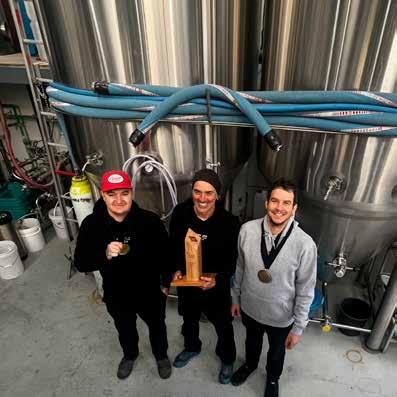
that’s where Bruno began experimenting with different styles of beer, along with different hops, yeast, barley and water.
Bruno says the quality of Raglan’s town water is ideal for making beer, “once we filter out the chlorine that the council puts in it, we get it back to its natural state. Essentially our beers are made with pure volcanic spring water which has a unique and favourable mineral profile for brewing”.
Other than the purchase of three specialised 2000 litre fermenters, the rest of the brewery equipment has been repurposed - a mill from a Cambridge farm to crush barley, dairy vats as brew kettles, the hot liquor tank was recovered from a farm gully and an old sink from Xtreme Zero Waste is now keg washer/bottling bench.
Much of this ingenuity is down to Matt’s dad Pete who runs Raglan Engineering and is known around town as a fixit man.
“We’ve built everything next door (at Raglan Engineering). It took us five years to piece all of the kit together.”
Bruno says it would have been cheaper to buy a turnkey brewery from China.
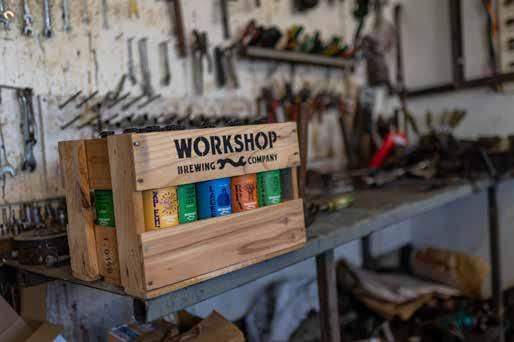
“The ethos that we've always had is around utilising existing materials that cost you labour and cost you time, but it has a story.”
There’s a sense of serendipity that the brewery is housed in the building on Park Drive. Back in the day, it was used to store the grain destined for Waikato Breweries back when

goods came by ship over the Raglan bar.
“It's kind of funny - the grain still comes here now by a different route, but it doesn't leave it gets converted to beer here,” Bruno laughs.
While they may be riding high after their win at the beer awards, there are no plans for expansion.
But staying true to their small batch roots and sustainability ethos is not without its costs.
The excise tax all alcohol producers pay is the same regardless of the volumes produced, added to this is a scale based on the alcohol content.
“The issue is excise tax is generally a targeted tax to deal with alcohol-related harm and that’s not what craft beer is really all about. That’s probably the RTD lower value type of drink. Money should be directed towards managing people that have alcohol problems, but people aren't buying craft beer at 14 bucks a litre to go on benders,” he says.
Australia, the UK and America have excise taxes scaled by volume, Bruno says, and the boutique distilling industries there are flourishing.
And, he adds, the craft beer movement has made a positive impact on the hops industry in New Zealand, with new farms emerging around the country, generating jobs and increasing diversity of hops to keep up with the brewers’ demands for unique flavours.
“If the craft beer industry goes down, the big guys will end up buying small craft brewers as they've done before. Because the only way for a small businesses to stay viable is to create more volume to try and get those small margins. It doesn't make a lot of logical sense to me and it takes away from that creative spirit that small producers want to have.”
CHAMPION MICRO NEW ZEALAND BREWERY
Workshop Brewing
WHEAT & OTHER GRAIN
Good George Hefe Mulligan -Trophy Winner
INTERNATIONAL LAGER
Good George Pilsner – Silver
NEW ZEALAND STYLES
Good George Lager – Silver
Workshop Brewing Pete’s Pilsner - Silver
INTERNATIONAL PALE ALE
Good George Haymaker IPA - Gold
Workshop Brewing Xpeh! – Gold
Good George APA - Bronze
Workshop Brewing Raglan Pale Ale – Bronze
INDIA PALE ALE
Workshop Brewing Wakey Jakey – Gold
JUICY / HAZY
Good George Fog City – Gold
Good George Deckchair – Silver
Good George Haze of Glory – Silver
SPECIALITY & EXPERIMENTAL
Good George Cherry Cola Sour – Bronze
STOUT & PORTER
Workshop Brewing Chocalot - Silver
NO & REDUCED ALCOHOL
Good George Virtual Reality - Silver
New Zealand’s largest and only national stone benchtop fabricator is banning engineered stone that contains more than 40 percent silica – part of its ongoing efforts in the fight against silicosis.
AGB Stone, which employs more than 130 people at its six factories across the country including Te Rapa premises, will phase out high-silica slabs and cease working with suppliers who cannot meet the company’s standards.
Long-time advocates for safe work practices, AGB owners Cam and Christine Paranthoiene have, for many years, led the way stone fabricators should operate – including creating proprietary processes, investing millions of dollars in state-of-the-art machinery and being early adopters of wet-cutting and air monitoring as a safeguard against the potentially-fatal lung disease silicosis.
“We want to protect our staff, our customers and our industry. It’s the right thing to do,” Paranthoiene says.
“It is the single most effective and easiest thing that any fabricator can do to step change the risk of silicosis. We now have a viable alternative, so it’s time everyone in the industry made the change.
“You cannot have health and safety and professionalism, and be the cheapest. You will always get cheaper but at what cost? We feel this is so important
that we are prepared to take a hit to our business [losing customers who want a lower priced product] in order to make this happen.”
The scale of the danger of silicosis from dust emitted when stone is dry cut or polished was not fully known in the industry until 2019.
Silica levels in standard engineered stone are around 90 percent
The New Zealand Engineered Stone Advisory Group, supported by ACC and WorkSafe was established in June 2019 to ensure the safe practice guidelines for stone fabricators with AGB instrumental in setting up those standards.
AGB had previously conducted rigorous air testing to validate the effectiveness of its dust management practices. The results were less than 50 percent of the acceptable
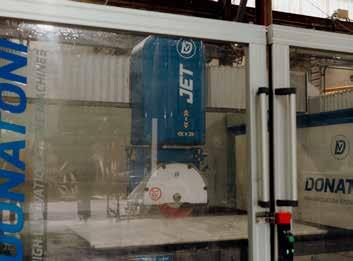
Workplace Exposure Standard for any industry. This validation reinforced AGB’s commitment to exceed minimum requirements.
WorkSafe issued 113 notices to 64 businesses that year, including 21 prohibition notices and 71 improvement notices. The following year that rose to 166 notices to 75 businesses –however there were only three prohibitions, but 115 improvement notices. ACC has received 140 claims for assessment since September 2020. There have been no reported deaths in New Zealand.
Paranthoiene feels a total ban, as being investigated by the Australian government, is an excessive and unnecessary move – if using low-silica product with proper processes in place.
To clearly differentiate from standard solutions, AGB has created a low-silica engineered stone offering – Better Benchtops – fabricated using NZESAG RCS (Respirable Crystalline Silica) Accredited methods.
“Silica levels in standard engineered stone are around 90 percent. By insisting on no more than 40 percent silica and with robust safety processes, Better Benchtops will offer peace of mind for our staff and customers.”
It is anticipated that the
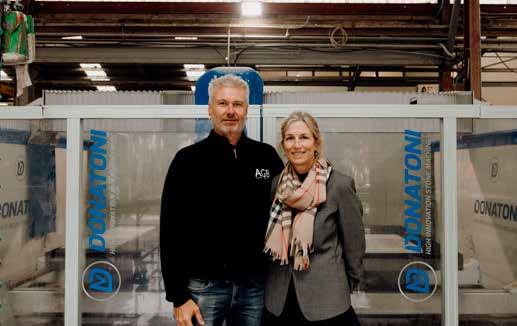
compliant product will become progressively available from later this year – and Paranthoiene has been encouraged by the response from customers wholeheartedly supporting this initiative.
Sai Kumar Gannavaram has been working at the Te Rapa factory for four and a half years and he values AGB’s level of protection for its staff, compared to others in the industry.
“I have worked in this industry for seven years and left places where I didn’t feel my safety was a priority. AGB is way better. I have a mask, water-fed tools uniforms and warm water.”
In April, the New Zealand Council of Trade Unions urged the Government to protect workers exposed to hazardous material in engineered stone, emphasising that terminal


Are you a Waikato entrepreneur with a brilliant business idea or a small business owner keen to grow and take your startup to new heights? Soda’s eightweek Ignite Waikato business fundamentals programme will teach you everything you need to know about starting and running a successful business.
Experienced and trained Soda facilitators and business experts will guide you through each step of the journey.
The course is aimed at start-up founders who are looking to launch their business and small business owners who are ready to take the next step. Designed for both start-up
founders and small business owners, this comprehensive in-person programme will equip you with the essential knowledge and skills to take the next steps in your business. This proven programme and group learning environment will give you all the tools you need to get your business humming.
START DATE: 11 October (for eight weeks)
TIME: 5.30-7.30pm
PITCH NIGHT: 4 December
LOCATION: Soda, Wintec, Hamilton
Applications close 24 September visit www. sodainc.com/start-ups/ignite to apply.




illnesses such as lung cancer, silicosis and other autoimmune diseases are preventable if proper action is taken.
In a recent statement, Workplace Relations and Safety Minister Carmel Sepuloni said WorkSafe would revisit high-risk businesses, and if there were problems, “use all enforcement actions available, including investigation and considering prosecution where it is warranted”.
WorkSafe estimates 60,000 engineered stone slabs are imported each year, and there are believed to be approximately 130 businesses that fabricate them into benchtops for kitchens, bathrooms and commercial premises.
“AGB is in a unique position, as it services all parts of New Zealand,” Paranthoiene says. “We can use that reach to influence fabricators and suppliers across the country to follow suit.”

Software system designers consider User Experience as integral at the start of every project, rather than an optional extra tacked on at the end.
User Experience (UX) and User Interface (UI) design are disciplines that Company-X clients have many questions about.
Company-X UX lead Hohepa (Cory) McKenzie and UX/UI consultant Briana Christey have decades of experience and many answers.
McKenzie was recently named a finalist in the Te Hapori Matihiko Awards in the Whiua ki te Ao (Take it to the World) category for his contribution to global projects in digital and tech.

“UX encompasses all aspects of a person’s interaction with a company’s products or services,” said McKen-
zie. “UI involves the design of the visual interface.”
“The visual elements,” added Christey, “such as typography and icons.”
“UX design is about how people experience the digital application and understanding how real people will use the product to complete tasks in the context of their day.”
“UX and UI ensures the product is designed in the best way.”
There is contention in the software development industry around definitions of both. Different schools of thought.
McKenzie, who lives and breathes UX design on Company-X projects for US big tech company Cisco Systems Inc, believes the industry could avoid confusion by dropping the UI term all together.
“What I’ve come to realize is that you have this perfect scenario of UX,” McKenzie said.
“The more I work I do as a designer on Cisco projects, and the more that I listen to UX gurus from around the world, the more I realise you must pick and choose what aspects of the UX you are going to focus on. You never really get to do the whole thing.”
McKenzie has over 20 years UX experience, working with clients such as Cisco Systems Inc, Hamilton City Council and Te Ringa Maimoa Trans-
port Excellence Partnership.
When the New Zealand Government targeted Māori and Pacific Islanders with a letter drop encouraging them to get vaccinated against COVID19 it focused on the UX.
“That campaign had no app or interface,” McKenzie said.
“It was all about the user experience of receiving a letter. The language had to resonate with the demographics and the graphic design align with them as well.”
Christey has five years UX and UI experience, working with clients such as business management software provider Magnetize.
Company-X led a full product development process resulting in the design and build of an entirely new, easy to use, version of Magnetize from the ground up.
“Beginning the Magnetize project with in-depth, qualitative research set us up for success,” Christey said.
“We talked with a dozen businesses in the trades and civil construction industries to understand the fine details of how they run their businesses. From this research, we were able to fully understand their needs, their pain-points and in turn, design software that delivered exactly what they needed: speed-to-work and full visibility of jobs.
“Company-X’ software
architect Luke McGregor and I did the UX research work together, which then informed user personas, user flows, wireframes, roadmap priorities—all the details how each feature should work.”
Christey’s research helped realise a shift from job management to job enablement.
“With a fresh approach, we were able to create some exciting features. Business owners can schedule a job in literally seconds using a simple drag and drop calendar, and staff can ditch the dreaded timesheets by using the simple, time logger spinner that pre-populates time for you,” Christey said.
“It’s the most rewarding thing when people say they can literally feel the weight coming off their shoulders when they see how Magnetize does everything, they need it to do, and faster than any other tool they’ve used.”
Magnetize’s investment in UX research to inform a new UI paid off.
“There’s a growing awareness among businesses about User Interface Design and User Experience Design and how fundamental both are to creating a successful digital product,” Christey said.
“Many businesses have questions about what UX and UI design involves, and the differences between the two.
Company-X saw astounding growth in its first decade. Co-founders and directors Jeremy Hughes and David Hallett explore why.
Company-X was recognised by Deloitte as one of the fastest growing technology companies in the Asia Pacific region for three of its first ten years.
The Deloitte Fast 500 is an annual ranking of the fastest-growing technology companies in North America, Europe, and Asia-Pacific. The ranking is based on percentage revenue growth over three years.
In 2017, the Waikato software specialist ranked 330 on the Deloitte Asia Pacific Fast 500 list with a revenue growth rate of 138 per cent. The following year, Company-X ranked 387th on the list with a revenue growth rate of 135 per cent. At the
same time Company-X was named the Fastest Growing Technology Company in the Central North Island. In 2019, Company-X ranked 496th on the list with a revenue growth rate of 98 per cent.
Company-X co-founders and directors David Hallett and Jeremy Hughes said Company-X being recognised by Deloitte was a testament to their team’s hard work and dedication to clients.
“The Deloitte Fast 500 is widely regarded as one of the most objective rankings of technology companies worldwide,” said Hughes.
“What drove our growth was our success delivering on projects and delivering to what we quickly uncovered as
our three key values,” Hughes said.
“Making our clients look good, doing what we said we’d do and giving our clients choices.
“Those three things gave us a history of delivering innovative projects, a history of service excellence, and word-of-mouth did the rest in the overseas market and in the New Zealand market.”
Hughes also credits a recruitment policy that saw the team reach out to likeminded and more than capable experts.
“We were phenomenally successful in bringing on more great people. And I’m happy to say, that continues today.”
Those experts, when

People are interested to understand where to even start when designing a new software product.”
Christey reinforces McKenzie’s view that UX and UI go together in a software development project.
applied to the right projects, helped Company-X win many awards.
“If there’s one thing that helped us grow it was making people look good,” Hallett added.
“As soon as you make your clients look good, they’re going to tell their mates, ‘These guys are the guys. This is the team.’ Our reputation was enabled through a very deliberate methodology of hiring the best people for the best roles, and the best kind of people with the right kind of attitudes. What fuelled our growth was successful outcomes. That created raving fans and goodwill in terms of referrals both domestically and internationally.”
ple of times in my career so far where I’ve been itching to get started on creating beautiful UI designs, but I’ve stopped myself.”
Awards Company-X has won by Year
“We employ UX methods early on in the project to understand our users and the journey we want to create for them before designing the user interface,” Christey said.
“To give your product the best chance of success, it’s important to not jump the gun by going straight to thinking about what the user interface could look like. This is where a lot of companies fall short; without understanding the full requirements, the solution cannot deliver.
“As a UX/UI Designer I hold myself accountable to trusting in the process and the methods. There’s been a cou-
Christey said her internal monologue goes something like: “Hang on, let’s just have a chat with a few more users first, and finish the user journey mapping.”
User journey mapping includes drawing a flow chart of the user’s experience in completing a task.
“By doing those tasks, I’ll realise some vital considerations I needed to uncover and take into the UI design phase.
“There is a toolkit of UX methods we can employ within the Software Development process to give the product the best chance of success. Widely used UX methods include user interviews, affinity mapping, user personas, user journey mapping and wireframing.”

In August 2021, as New Zealand moved into yet another Covid-19 Alert Level 4 lockdown, the future of tourism in our region looked decidedly uncertain. But two years later things are very different – our international borders have fully reopened and we’ve seen the removal of the last of our country’s Covid-19 restrictions, signalling a return to normal life.
In the time since international borders fully reopened to most travellers at 11.59pm on 31 July 2022, tourism in Waikato has recovered at an impressive pace.
Earlier this year, we celebrated our first summer season with international visitors since early 2020. Despite challenges with staffing and severe weather events that could have derailed the summer, our tourism operators reported a good season.
Conferencing has been strong over the past 12 months and looks set to continue, with events like the trans-Tasman
AuSAE LINC conference and the New Zealand aquatic industry’s WAVES conference set to bring hundreds of business travellers to the region in September. The incentives market is also performing well, with Amway – the world’s largest direct selling company – choosing New Zealand, including the Waikato, as the destination where it will send the top performing employees from its China offices as part of its
incentive programme to motivate and reward them.
Successful events like the World Rugby Sevens, international cricket fixtures, Fieldays, Balloons over Waikato, Matariki ki Waikato Festival and the NZ Darts Masters all add to our reputation as a vibrant city and region, attracting visitors and boosting the economy.
Most recently we welcomed fans and teams from Zambia, Japan, Switzerland, Norway, Portugal, Vietnam, Costa Rica, Argentina and Sweden as part of the FIFA Women’s World Cup 2023TM. This influx of visitors, at what is traditionally a quieter period for international visitors, has been another boon for the region.
By the numbers, we’ve seen 13.2 million visitor days to the region in the past year, with 88 per cent of those domestic. Both domestic and international visitor spend is up on the previous 12 months, by 18 per cent and 225 per cent respectively. Hamilton City has the top overall

BY NICOLA GREENWELL
commercial accommodation occupancy rate for the country at 75 per cent, with the rate for the region coming in three per cent above the national average of 57 per cent.
While more work is needed, there has been some good news for those struggling to find staff, with Immigration New Zealand approving close to 18,000 Accredited Employer Work Visas since May last year.

Cooks and chefs are leading the charge into the country, representing almost 30 per cent of all approved visas.
New Zealand has also seen more than 60,000 Working Holiday Visas approved since March last year, with an additional 32,276 granted under special direction from the Minister of Immigration due to the impacts of being unable to enter New Zealand during the Covid19 pandemic. Working Holiday Visas offer dual benefits for the tourism and hospitality sectors, by bringing people who are both visitors and workers into the country.
Perhaps the most exciting news is that this all doesn’t look like slowing anytime soon. Our operators across the region are reporting strong interest and
Anumber of conversations recently have led me to ask whether we are focusing our collective problem solving attention on the right part of the problem with regards to housing affordability.
Last month I wrote about several new building technologies and speculated as to the potential of technology and automation to improve productivity in the construction sector. I’ve also previously touched on inefficiencies related to the often segmented, siloed work of different parties in property development and the need for a more joined up end-to-end development approach.
However, while they may help to bring down building costs over time, neither of these are likely to result in immediate improvements in the cost of new housing of the magnitude required to make it ‘affordable’. And despite recent drops, and changes to tax settings, the price of existing housing stock remains high and continues to enjoy a significant advantage over other investment options for those who have existing

BY PHIL MACKAY
Phil Mackay is Business Devolpment Manger at Hamilton-based PAUA, Procuta Associates Urban + Architecture
equity to leverage. Some councils are testing the idea of measures that would require developers to include a certain percentage of ‘affordable’ houses in new developments. While well-intentioned, I’m sceptical as to whether this would result in desirable outcomes. In the best case scenario such measures would only solve the affordability problem for the first purchaser, thereafter the market would again dictate
the price.
Organisations such as Bridge Housing are implementing innovative models to make home ownership available to those on more modest incomes, while others are exploring co-housing concepts and Māori hapū are initiating papakāinga developments to house their whānau.
Rather than focusing on affordable owner-occupied housing, if the core issue is providing places for people to live, more consideration should be given to building appropriate rental housing.
The Property Council has been advocating for measures to enable more ‘Build-torent’ developments in NZ for some time and their website offers excellent background on the concept.
In a nutshell, build-to-rent refers to developments of reasonable scale built specifically for rental, professionally managed and typically owned by investors who have shares rather than individual unit titles. For the landlord, provided certain criteria are met, build-to-rent properties are exempt from interest limitation
bookings for the upcoming September/October school holidays, and beyond into the 202324 summer season.
Our international markets are now all back on stream, with Australia and North America leading the way. This is supported by increasing air connectivity into New Zealand, with several more airlines announcing their return to New Zealand later this year.
Ten airlines, including Air New Zealand, Qantas, United Airlines, Delta and American Airlines, are now offering flights between New Zealand and the United States or Canada and the next couple of months will see 46 per cent more capacity – 300,000 more seats –from North America than last summer, with some airlines
offering more seats than before the pandemic.
The Tourism Export Council of New Zealand (TECNZ) International Arrival Forecasts 2023-2025 is forecasting a return of 80.4% pre-Covid total arrivals by year ending June 2024 and 100% by year ending June 2025.
As we move into this new era Tourism New Zealand and Regional Tourism Organisations (RTO’s) are focused on attracting high quality visitors – those that enrich our communities and create value more broadly for the benefit of our people, our place, and collective prosperity.
The challenge for all of us is to be ready to leverage these opportunities – something I have no doubt we’re up for.

rules and therefore eligible for interest deductibility, unlike other investment property.
For tenants there are a number of benefits. To qualify for interest deductibility tenants must be offered a rental term of 10 years, so security of tenure is significantly better than a typical market rental.
Also, when the intention is for long-term rental, developers will generally build to meet the needs of occupiers, rather than to meet the market for sales. This can mean more
diversity of types and sizes of home, and also more focus on providing amenities such as shared lounges or outdoor areas, gyms, or on-site cafes.
Similarly, when long-term maintenance costs are a key consideration, it makes sense to invest in the quality of materials and worksmanship.
As build-to-rent properties are professionally managed, maintenance requests are dealt with quickly, rather than having to deal with private landlords who potentially
don’t have the time, money or inclination to resolve issues appropriately. Addressing housing supply and affordability is a complex challenge requiring a range of solutions. We absolutely must find ways of building houses more affordably. However, home ownership may not be a realistic goal for everyone, and we have a responsibility to make sure that everyone in NZ has access to safe, suitable, places to live. Build-to-rent is another tool we can use.





Hamilton’s Braemar Hospital has become the second largest private hospital in New Zealand with the completion of a new $6.5m 18-bed surgical wing.
The new wing, the final part of the second stage of the charitable hospital’s development was opened recently by the outgoing Braemar Charitable Trust chair Victoria Ashplant.
It brings the number of beds to 109, making the hospital New Zealand’s second largest private hospital on a single site, after St George’s Hospital in Christchurch, with 115 beds.
Braemar Hospital chief executive Fiona Michel said the milestone was another significant achievement in the hospital’s 97-year history.
“We are proud of the growth achieved, but also of our continued commitment to recognising and serving the needs of the Waikato community.”
She said an awareness of
changing social and clinical needs in the population dictated decisions to expand, to buy new equipment and to provide space which helped healing. The new wing has a dedicated whaanau room where family can have private time while accessing outdoor space on the roof garden.
“We always take a holistic approach to design. Optimal healing requires us to meet a range of needs.”
The hospital has also been actively supporting the public health system.
“Private hospitals are now a very significant part of the health solution. Last year, Braemar experienced an incredible upswing in patient demand. We have had record numbers of patients (over
1000 a month). There are well documented bottlenecks in healthcare. We need to ensure each part of the supply chain is able to cope and that we are not restrained by availability of staff, post-theatre beds and equipment – so developments like our new wing will make a tangible difference for our community.”
Braemar was also seeing patients with increasingly complex needs. “Not all private hospitals have the capability to support complex cases that need one-on-one care, but it’s something that Braemar has always been committed to.”
Investment in equipment and clinical innovation continued to drive decisions around future capacity and efficiency. The hospital’s most recent purchase was a Velys robot used in knee surgery. “New tech can improve recovery times. Procedures are more targeted and the patient impact is reduced.”
Technological advances also affect throughput, which influences future planning. “Technology provides solutions over
time. What hospitals may have considered essential years ago, may have already been solved by technological innovation. Leading-edge is constantly being redefined in health.”
The hospital has plans to

Braemar CEO Fiona Michel and Braemar patient services manager Sheree Smith
further expand on its 4ha site beside Waikato Hospital. The hospital currently has nearly
200 credentialed specialists, 11 operating theatres and five HDU/ICU beds.
Aproposal to construct a waste to energy plant in Te Awamutu has been reactivated.
An application to build the plant at 401 Racecourse Road was first lodged with Waipā District Council by Global Contracting Solutions in December 2021. The proposed plant will incinerate 150,000 tonnes of waste annually which will be used to generate electric power from steam.
Global Contracting Solutions first lodged the application seeking a non-notified resource consent. This is a shorter and simpler process but would not allow public input. Resource consents are required when proposed activities do not comply with the council’s District Plan.
In September 2022, council advised that
public notification would be required. This allows any member of the public, or organisation, to make submissions.
Global Contracting Solutions has now paid the fee required for the resource consent application, meaning the consent application is now live. The company is also seeking a resource consent from the Waikato Regional Council relating to discharge contaminants into the air. That is also a publicly-notified process. The resource consent applications will be considered jointly by both councils.
Public submissions on the proposal will open from Friday, September 15 and will close on Friday, 13 October 2023. Public notices advising the process will be placed in local newspapers.
Ever walked down a Hamilton street only to be stopped in your tracks by a stunning mural?
Behold the work of Boon Arts, a charitable trust transforming the city since 2017 with the aim of ‘art everywhere, everyday’.
Boon murals are plentiful in Hamilton's city centre, but few know the stories behind them, or even how many lurk in the hidden alleyways of Kirikiriroa. Enter the Boon Street Art Walking Tours!
For over one hour, their knowledgeable guides (many of them artists themselves) will help you discover the secrets of some of the 70-plus murals around Hamilton City.
Sponsored by Love the Centre, the tours run every Saturday through spring, from the Saturday, September 2 until Saturday, November 25. Tours leave from Love The Centre, 10 Garden Place at 2pm, and take you around a two block radius. It’s not far to walk and there’s a tonne of stories to keep you entranced.
These immersive tours are the perfect opportunity to see the world at a slower pace and to really take in the vibrancy and creativity of Hamilton.
Tour organiser Sasha McLaren says people love discovering or rediscovering parts of the city they’ve never seen before.
Sprinkled throughout is
some of the rich history and kaupapa of Boon Arts, including some surprising stories of the who’s and why’s behind how these stunning murals came to be.
“I loved slowing down and seeing the city in a new way… This tour was very engaging and I've learnt lots about the mural culture in our community," says a previous attendee.
Boon also offer a range of private bespoke tours, for individuals, school groups, small groups or whole teams.
These group tours are ideal for businesses wanting something different for their team building and typically finish up with a drink and nibbles somewhere fabulous
- cocktails at Wonderhorse anyone?
You can also book an immersive private art tour, which has a muralist as your exclusive guide, and includes a tour of their vibrant and active art studio. These can be arranged by contacting sasha@boonarts.co.nz
With every tour booked you’ll be supporting Boon’s vision of more ‘art everywhere, everyday’ and providing an income for the creative industries in Kirikiriroa.
Take a walk on the wild side and book your tickets at www. eventfinda.co.nz/2023/boonstreet-art-walking-tours/ hamilton.


If you’re out and about on any New Zealand road these days, and you’ll likely see Electric Vehicles (EVs). They’re becoming quite commonplace on our roads, and there’s a good chance that we may have helped a few of those get up and running!
That’s because as the world shifts to using more sustainable energy sources, we’re using our energy experience and practical insights to help businesses make the move to EVs – for good. Using our experience and smart infrastructure ideas, we help put businesses on the road to sustainability faster, smarter and at just the right price.
Because of this We.EV has seized the opportunity to lead the way in supporting businesses to transition their eets to EVs by investigating, designing, installing and provide an end-to-end solution to meet the customers’ needs to minimise costs now and into the future. Community owned, our vision is simple; to help businesses shape a better, more renewable future We guide and support businesses who want to make the shift to EVs with speci c plans and infrastructure that’s exible, coste ective, and can expand as your EV eet does. From accurate advice to on-the-ground planning, every customer we work with has unique needs and goals. So whether your eet of EVs is large or small, or you’re even just at the early stages of thinking about it – it pays to talk to the local experts rst.
How to get started on your EV transformation
So, you can make the change once, and do it properly, there are a number of things you’ll need to look at, says Craig Marshall, Head of We.EV. He explains it should start with good advice before you start laying cables. “There are a lot of people out there who are keen to help with suggestions and hardware. But it all starts with solid advice that simply comes from handson experience. We’ve been working with energy for decades. And we’ve seen cases where clients were told to invest hundreds of thousands of dollars, when in fact they needed nothing of the sort for their usage.”
So, if you’re ready to make the smarter EV infrastructure choice and you’re ready to take your sustainability goals up a gear – get in touch with the EV experts.
0800 800 935 | we-ev.co.nz

From advice and planning to design and build, We.EV helps businesses become future-ready with their Electric Vehicle charging infrastructure. So whether your eet of EVs is large or small, or you’re even just thinking about it – it pays to talk to the local experts rst. we-ev.co.nz

Like any small business, the business of art can be a hard road travelled, Māori multidisciplinary artist Daniel Ormsby (Ngāti Maniapoto, Ngāti Kaputuhi, Ngāti Uekaha) uses his years of experience to guide up-and-coming artists through the roadblocks on their journey.
You can’t miss The Red Shed where Daniel is based, it’s on the road that leads to one of the country’s best-known tourist spots –the Waitomo caves.
Opened seven years ago, The Red Shed is not just a space for creating art it is also a place for creative thought and learning to flow, and many artists have passed through its doors.
“It was just an idea as everything else is. I was in a comfort zone working from home. The home is a very comfortable place but it also has limitations. I just recognised the need for myself to grow,” he says.
Daniel and a couple of friends decided to rent a house locally and the building that would become the Red Shed was available.
Housed in one of the oldest buildings in Waitomo, they set about transforming it into a gallery and studio space with an adjoining covered work area outside.
“It’s about 135 years old, at least. But it’s perfect for what we do. It’s not a sterile environment so it doesn’t matter if we can drop paint. It’s a great creative environment,” Daniel says.
“We’re in prime location just before the village so everyone has to go past us, which is the blessing and a curse.”
The curse of it being the time it takes from creating art to extend manaakitanga
(hospitality) to visitors, Daniel says.
In the past few years, The Red Shed has become less of a public gallery and more of a place to do the work of creating; it was a key learning that came out of Covid for Daniel.
“It’s been a bit of a flux and we’ve diminished the gallery aspect of it because we weren’t getting any work done,” he laughs.
“When Covid came the tourism slowed down and we closed the doors and discovered that we were getting so much more work done.”
An established artist for many years, Daniel knows he has the luxury of already having his name out there.
His tā moko (tattoo) bookings fill up quickly, his carvings and paintings are widely sought after and there’s always commission work on offer.
Because of this success, Daniel mentors other creatives as they set out to make a career in the fickle world of art.
“I’m a bit of a helper. I think it’s just an extension of who I am. I was doing arts in a time when I was mocked for it or told to get a real job. I went through the hard times and just pointing out potholes so others don’t have to stand in them or to accelerate people so they don’t have to struggle.”
From a shearing family, Daniel formally started his art journey nearly 30 years ago



at Te Wānanga o Aotearoa but he had been carving well before that.
He studied contemporary art during the day and carved at night, and graduated with a double major in contemporary and traditional art.
He then went on to tutor at the wānanga and also did a stint in the marketing department, which helped build an important skill set in any business.
It’s this marketing skill that Daniel puts to good use on Facebook, which is where most of his work sells.
“I’ve really only ever used

Facebook. My timing with Facebook coincided with my tā moko career. I had a style that was quite different and it stood out at that time. People would comment on my work and others would see and it grew from there.”
In the early days of his career, Daniel became a single father on the DPB and he used this time to learn te reo and continued honing his creative skills. He worked in his own home before being given the opportunity to use a shed by a local drug and alcohol, mental health and
wellbeing organisation.
“In return I volunteered to take troubled youth two to three days a week. Because nothing’s free and the work ethic I got from my parents made it important to me to feel that I’m giving back.”
Daniel continues this philosophy of giving back in the opportunities he provides at The Red Shed.
Opportunities for emerging artist to work alongside established artists, for artists to gather and work alongside each other and tonnes of opportunities for inspiration and art kōrero (discussion).
And because of the work ethic he gained from his parents, Daniel expects a lot from the people who use the space.
“You’ve got to want to do the work. A lot of people would like to just come and hang out because of the atmosphere, but you have to be working. Your work shows if you’re talented, and also if you’ve got the ethic.”
Like any business, the team culture is an important part of ‘hiring’ and fitting in with the values of The Red Shed is important to Daniel.
“I’ve got a tikanga (principles) and mauri (spirit) here where no one’s better than anyone else.”

It can also be a place of healing for the artists that spend time at the shed.
“Artists are drawn to the energies present at shed,” he says. “The arts help many reconnect with a sense of meaning and purpose in their lives, particularly when they’ve passed through trauma or have reached a spot in life where growth is required.”
And while Daniel may have been in the business of art for decades, he’s not afraid to re-examine his business practices.
Last year he attended Creative Waikato course Elevate with a number of other artists involved in the shed.
The nine-month programme supported creative practitioners to investigate how they could have achievable, financially viable and sustainable creative careers.
“I had to do it because I forced everyone else to,” he laughs.
“But I got so much out of it. You just get deeper roots. I’d get by on a strategy of just do the art and face the business side of things it as it comes. That’s good to a point. But then it gets messy. So, it’s a necessary topic for artists – you can’t run from it forever. You’ve got to deal with all that stuff.”

The future of agricultural innovation is reliant on the sector being more open with its data.
This was my key message at a panel discussion I was invited to participate in at the National Agricultural Fieldays in Hamilton by the NZ Institute of Primary Industry Management.
Open, or freely available, data would help farmers to collaborate with each other and other stakeholders in the agricultural sector. Such collaboration could lead to the development of new technologies and practices that would benefit the entire sector.
At a higher, industry-wide, level open data could help farmers identify new markets.
Open data can provide farmers with the information they need to make better, data-led, decisions about crop planting, fertilising, animal health, pest control, and many other aspects of their operations.
Using open data to benchmark would enable the sector to make more data-led decisions and allow improvements in operations, yields, and environmental impact.
The New Zealand transport sector has done both of these things by sharing its data through the world’s first national transport quality assurance tool, Transport Insights, built by Company-X.
Open data can be used to track the environmental impact of agriculture. This information can be used to develop more sustainable agricultural practices, such as reducing the use of pesticides and fertilisers.
At a higher, industry-wide, level open data could help farmers identify new markets. Plenty of organisations are interfacing with primary industries around the world and using open data to innovate.
Trust Alliance New Zealand (TANZ) is working with open data to help make the primary sector more transparent, efficient, and sustainable. Its Data Hub is a repository of open data related to the primary sector. Its Digital Farm Environment Plan project is developing a digital platform that will allow farmers to share their environmental data with other stakeholders, such as government agencies and retailers. Its Digital Wallet project is developing a secure and convenient way for farmers to store and share their data.
The Food and Agriculture Organisation of the United Nations Sustainable

BY DAVID HALLETT
David Hallett is a co-founder of software specialist
Company-X.
Agriculture and Rural Development Knowledge Platform provides open data on a variety of sustainable agriculture topics. Its Aquastat database provides open data and is also being used to track data on water use in agriculture. This information can be used to develop more efficient water management practices in the face of climate change.
The Global Open Data for Agriculture and Nutrition initiative is working to make agricultural data more accessible and usable to help farmers track crop yields over time. This will help them identify areas where yields are low, and to develop interventions to improve yields.
The World Resources Institute's Food Loss and Waste Data Explorer uses open data to track food production, distribution, and consumption. This information can be used to identify ways to reduce food waste, which is a major problem in the agricultural sector.
Open data has the potential to transform the agricultural sector. The future of agricultural innovation is reliant on open data.

Mike Neale, Managing Director, NAI Harcourts Hamilton
Anglesea Tower in Hamilton’s central business district is on the market for sale, offering an opportunity to redevelop the seven-level building and position it for the future.
A familiar part of the Hamilton skyline since 1987, the building sits atop the former Farmers Centre podium at 218 Anglesea Street. Its sale presents an exceptional value-add opportunity in the heart of Hamilton’s CBD, said Mike Neale of NAI Harcourts, who is handling the sale alongside Warren Hutt of CBRE.
“With the sole remaining tenant in the building, the Ministry of Social Development, due to vacate their premises in late 2024, this versatile asset can be considered a blank canvas for potential redevelopment into modern office space or repositioning into apartments, student accommodation, a hotel or a combination of uses.”
The 5,742sqm building, which is for sale by deadline private treaty closing at 4pm on Thursday 21 September, contains six office floors of around 960sqm each, along with the potential for future development of a panoramic roof terrace. 43 secure car parks are situated on the lowest level (level four).
staff. The popularity of this precinct will be considered a big plus for anyone planning a redevelopment of the Anglesea Tower next door.”
The current ownership of more than 20 years has made the call to divest the building, which given its secure car parking and spectacular views, offers an ideal package for future occupiers.
“The office floors provide amazing panoramic views over the city of Hamilton and also captures excellent sunlight, while the vista is equally mesmerising at night with glittering lights extending into the distance.”
Lift and stair access to the tower is provided via a main entrance foyer on Anglesea Street, with an alternative entry point from the level four car park. It is part of a unit titled complex which also includes the KPMG building, along with the large podium featuring retail space and car parking.
The property’s strategic location is further cemented by the core CBD hospitality precinct just 200m away, along with the Hamilton Transport Centre bus station a few blocks up Anglesea Street.
“The Anglesea Tower’s strategic location and multiple possibilities for refurbishment

The existing lease generates net passing income of $385,855 a year, providing desirable holding income while the new owner plans their redevelopment, which could add significant value to the property given its excellent location and attributes.
“The building’s close proximity to Wintec Te Pūkenga’s city campus opens up a potential opportunity for student accommodation. Alternatively, the tower’s prime location adjoining the world-class Union Square office and retail development makes it a perfect candidate for conversion into a hotel or apartments.”
Union Square is an impressive 23,000sqm development spread over five buildings combining retail, office, and lifestyle amenities. Tenants include Rabobank, AA Insurance, Craigs IP and Baker Tilly Staples Rodway, along with the recently opened car park building providing 320 spaces plus extensive end of trip facilities.
“Union Square’s premium-grade office space and focus on employee wellness and enjoyment has proved highly successful for the businesses which have relocated there, in terms of attracting and retaining

or conversion make it a highly compelling prospect for property investors and developers. Its seamless accessibility to key amenities and the thriving Union Square development make it ideally placed to capitalise on the continuing growth and evolution of the Hamilton CBD.”
The building, located near the corner of Anglesea and Collingwood Streets, is also within easy reach of the Centre Place shopping mall, new $75 million Waikato Regional Theatre development, Te Awa cycleway and river walks and Sky City casino complex.
Its location on a CBD arterial route also ensures vehicle accessibility to the north and south of the city, while Hamilton Airport is just 15 minutes away, providing a significant opportunity for a new owner.
While the owners have made the decision, the potential is to unlock the opportunity.
For further information, call today: Mike Neale Warren Hutt Ph 027 4515133 Ph 027 562 2244 Email mike.neale Email warren. @naiharcourts.co.nz hutt@cbre.co.nz

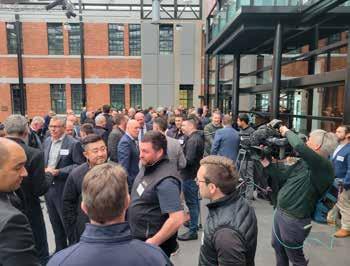






Local gin maker Terry Rillstone has made his mark at the 2023 Australian Gin Awards with some old favourites and a new Holland Road gin.
Attaining gold in the classic gin category, the newly released Holland Road entry was one of 17 entries to attain gold out of 58 classic gins from Australia and New Zealand distilleries.
The Holland Road Wild Ginseng and Manuka Honey picked up a silver and the Pink Grapefruit and the Kawakawa and Green Tea were both awarded bronze.
“I was pretty happy to go up against some pretty well-known distilleries and big names from Australia and New Zealand.”
These awards come on the back of wins at the 2022 New Zealand Spirits Awards where the Holland Road Sauvignon Blanc and Green Tea attained double gold, a gold for the Pink Grapefruit and the Kawakawa and Wild Ginseng and Manuka Honey came away with silver. It was after the NZ awards that Terry decided to take on the challenge of crafting a classic London gin.
All of his gins are tested on friends and family, and Terry takes on their feedback as he develops the flavour profiles.
The six-months he spent tweaking the recipe for the Holland Road Classic paid off at the Australian Gin Awards.
“I entered the awards on those changes without really market testing it too much. Yeah, I was happy with the result. Like the awards last year, I entered just to get some feedback.”
Based in Eureka and operating out of a humble home garage set-up, Terry started brewing gin in a one-litre copper about eight years ago.
What started as a hobby has

grown to a commercially operation in the past three years.
It’s an impressive set up now, with a state-of-the-art copper still, several stainless-steel holding tanks and all the gear required to craft and bottle award-winning gins.
Now that he’s riding a high with the Holland Road Classic Gin, Terry is developing a new spirit range that he’s keeping under wraps at the moment but hopes it will be ready to launch early next year.
“After I'd done this forth gin, I just thought I've got to do something completely different. There are so many gins out there now on and you can keep adding different botanicals and keep doing it, and that's great. But the market is a bit saturated with gin,” he says.
“Like everything, it takes a little bit of time and is quite complicated. The new range will definitely showcase some interesting and not so well-known New Zealand botanicals.”
The new spirit range will have a new look, that is also currently being developed.
The Holland Road gin
branding features an image of a 17th century plague doctor and might seem inspired now but little did Terry know that the Covid pandemic was just around the corner when he went commercial.
Hidden behind crow-like masks, plague doctors relied on the innate power of botanicals both as protective talismans and as a source of natural healing.
Inspired by these ancient traditions, Terry sources natural botanicals long used for their protective qualities, he particularly favours New Sealed native botanicals, including pohutukawa stamen, harakeke seeds, kawakawa berries and leaves, totora and the bark of a 100-year-old rimu.
Just like the growth in popularity of craft beers, gin has seen a resurgence in New Zealand.
The handful of commercial distilleries in New Zealand 15 years ago has grown to almost 150, with about 85% specialising in gin. Most of these, like Holland Road, are boutique, handcrafted operations.
Visit www.hollandroad.co.nz to find out more.

It is tradition that immigration is a hot topic at election time, but this year there has been very little rhetoric. Normally the various political parties are promoting for more, or less, migrants or particular policies around certain categories of migrants but nothing (as yet).
Congratulations on your promotion, and for this timely opportunity to contribute our 30+ years of experience in New Zealand immigration work to help inform your thinking about your approach to the immigration portfolio.
Obtaining residence is the main motivating factor for migrants to relocate from around the world to New Zealand and the SMC has historically been the main pathway for migrants to obtain New Zealand residence.
HThe current SMC requires applicants to score a total of 180 points under a range of criteria based on their job, work experience, qualifications, age etc - but this is all about to change!
istorically the immigration portfolio was seen as somewhat of a poisoned chalice, and it was not until the first John Key government in 2008 that this approach changed, and immigration began to be viewed more as an economic tool rather than just a means to protect New Zealand jobs. The immigration portfolio has since developed into one of significant strategic importance which influences many aspects of New Zealand society, workforce and the economy. Immigration is now a key Government portfolio.
So what have been the “immigration take-outs” of the last six years of the current Government?
Looking at the big picture.
Firstly, this period was significantly impacted by the Covid border closures and, generally speaking, the management of immigration during the initial border closure period was appropriate, in a difficult and dynamic environment. However, the closure went on too long and the reality of families being unnecessarily separated for extended periods, and a reluctance to effect change, was not justifiable. As a consequence, too many families and businesses experienced undue hardship, and their recovery has been slow and painful.
New Zealand should not rest on its laurels and expect that it continues to be one of the most desired migrant destinations, as it is not, and we are trending backwards. In fact, we will be doing well just to hold onto the new migrants that we do initially attract to this country.
From 9 October the revised SMC will require a total of just 6 points which will comprise points for either vocational registration, or recognised qualifications (minimum bachelor degree), or remunerationand points for up to 3 years of New Zealand skilled work experience. Applicants must have (or have an offer of) skilled employment with an Immigration NZ accredited employer, be aged 55 years or younger, meet the required English standard, and be of good health and character. The assessment of whether the employment is skilled is based on the payrate (which must be at least the median pay – currently $29.66ph), the job tasks, and whether an applicant is suitably qualified to work in the role.
The bottom line is that for many workers (eg; bakers, hairdressers, metal fabricators, welders, retail and hospitality workers etc) their only option is to have 3 years of qualifying NZ work experience and for their current job (or job offer) to be paid at, or above, the 1.5x median wage threshold (currently $44.49ph). Because this wage threshold is clearly above the market rate for many of the above roles these workers cannot qualify for SMC residence.
suitably credentialled to employ migrant workers, and to reduce migrant exploitation. After being delayed by Covid the AEWV was finally introduced in late 2022. By any measure the new regime has not resulted in a more “simple” policy, with changes having to be made on an ongoing basis. Moreover, the primary objective of the policy to reduce migrant exploitation has, in fact, had the opposite effect with unscrupulous employers using the legitimacy of their accreditation to dupe unsuspecting migrant workers in greater numbers than ever. The Minister of Immigration has now called for an enquiry into the operation of the AEWV – something that could have been avoided if the Government had taken a little more time at the outset to fully understand the impacts and ramifications of its’ policy changes before introducing them.
we once had, but one thing within our control is to make the immigration process easier and quicker, and world-leading, and to promote “the visa process” as one reason to choose New Zealand. Online visa applications, and the move to more automated assessment processes, will help but there is a very long way to go.
The existing SMC (180 point) policy will remain in place until the final Expression of Interest selection draw on 16 August, and applicants should urgently assess their eligibility under this category before it closes.
Other residence pathways remain available if the role is on the Green List Straight-to Residence or Work-to-Residence lists, or under the Care Workforce and Transport Sector pathways to residence.
Some examples of how a person can achieve the 6 points to be eligible for SMC residence:
• Architect – vocational registration = 6 points
• Electrician – vocation registration (3 points) + 3 years of NZ work experience (3 points) = 6 points
• Lecturer – master degree (5 points) + 1 year of NZ work experience (1 point) = 6 points
• Marketing manager – high salary ($88.98ph = 3 x median wage) = 6 points
The introduction of the 2021 Resident Visa changed the landscape for many of the migrants who were caught in New Zealand during the border closure. This visa enabled some 105,000 migrant workers, and their families (215,000 people in total), to transition to New Zealand residence and thus secure their long-term future in this country. The 2021 Resident Visa also permanently changed the “visa-landscape” in New Zealand with these people no longer needing to renew or change their temporary visas ever again. This was a bold policy move, and ticked many boxes. Unfortunately, the processing of the remaining applications, now at 18 months, has taken some of the gloss of this initiative, but kudos to the Government for making such a timely intervention. It is a pity the Government was not as bold in addressing the overstayer situation when the border was closed, as this was the perfect opportunity to do so.
We are an aging population and, by 2028, 1 in every 5 people will be 65+ years. Our birth rate of 1.6 children is well below the replacement rate of 2.1. Our rural townships are losing infrastructure and services, and while our schools need more teachers now, in a few years’ time school rolls will be declining and these teachers will need to find other jobs or go overseas. Family and lifestyle have always been the main reasons migrants choose New Zealand. However, these alone may not be sufficient to attract and retain the people and skills our country needs to maintain our living standards, let alone to grow. We need younger people who can contribute more, and for longer, to New Zealand.
One area which would help is for the Government to engage in more robust and well-planned policy settings, and to pressure-test such settings before these are implemented. It is acknowledged that policies have been necessarily “reactive” over the past 3 years but there have been too many instances of back-tracking of newly introduced policies when better planning and consultation would “get-it-right-firsttime”. The new Active Investor Policy should be first on the chopping block! We also need forward looking policies which are fit-for-purpose in today’s world. Policies which focus on enabling the most desirable migrants the opportunity to experience New Zealand and, if they choose to stay, then great. We should not demand that these people commit indefinitely to stay.
The new Active Investor Plus (AIP) policy was introduced in September 2022, and replaced the previously successful Investor 1 & 2 policies. The AIP is a very complex and difficult policy, requires investors to invest between $5 million and $12 million, and to take on an abnormal degree of investment risk. The AIP policy in its current form is unlikely to be successful in attracting significant numbers of investors. In the meantime, we have some 150 Investor 2 applications, and 330 Parent Retirement applications, which together total $880 million of potential investment, who have been waiting over 20 months for their applications to be processed. Not a good look all round.
In another change the Government has announced that the Accredited Employer Work Visa term, currently 3 years, will be extended to 5 years from November. This will be welcome news to many employers who will now be able to plan ahead with more certainty. However, the situation remains that if the worker is not eligible for residence during this time, they must leave New Zealand for at least 1 year before being eligible to apply for another AEWV. Existing AEWV holders will be able to extend their work visas to a total duration of 5 years.
• Crane operator – salary 2 x median wage ($59.32ph) (4 points) + 2 years of NZ work experience (2 points) = 6 points
The Productivity Commission report into immigration recommended a Government Policy Statement to set a clear strategic direction for immigration policy. This would be a good start and provide some overriding guidance (ideology!) to inform policy settings with a focus on what immigration can deliver for the good of New Zealand in the longer term.
• HR coordinator – salary 1.5x median wage ($44.49ph) (3 points) + 3 years of NZ work experience (3 points) = 6 points It is envisaged the majority of applicants will need at least some NZ work experience to achieve the 6 point threshold.
Early on in its tenure the Government announced its intention to replace six work visa categories with one employer focussed work visa – the Accredited Employer Work Visa. The idea was to simplify the work visa regime and to ensure that all employers were
New Zealand must attract the migrants it wants, and needs, in an increasingly competitive and dynamic international market, and one where people can now work-from-home anywhere in the world. We no longer enjoy the competitive advantages
One significant positive change has been the concerted transition to the online processing of most application types, and the move away from paper-based applications. While this transition has proved very exasperating at times, with different online platforms and ongoing technical issues, there is light at the end of the tunnel.
In summary this Government’s legacy has been one of many changes, not the least of which is having four Immigration Ministers in the last four years!! We can only wonder what changes the next Government will make!
The SMC changes will achieve their objective of simplifying this residence pathway. However, the reality is that for many migrant workers, and many in skill shortage roles, the fact that they no longer have a viable path to residence must influence their initial decision to come to NZ, and also what job roles they focus on. As always with immigration changes there will always be winners & losers (ask any Minister of Immigration!)
What about a work-from-homein-NZ visa? People could live in New Zealand and work anywhere in the world, now that would really put New Zealand on the map! Yes - Prime Minister!


I seem to love talking about circles and cycles, but this month’s column is centred around the opposite - the cross-shaped graph of supply and demand, with equilibrium sitting smack in the centre.
It’s a simple economic concept, and it’s one that’s become synonymous with the property market in recent years. Kiwis flooded home during and immediately after the height of the COVID-19 pandemic, which impacted the demand for housing here in New Zealand and caused house prices to increase at unprecedented rates.
But what’s interesting about this is how quickly the pendulum is swinging back, and how “lower supply and higher demand” is now starting to affect how property is priced. For the first time in nearly two years I heard an agent this week say, “we haven’t got enough properties to sell”, and this characteristic is being driven by a few factors I find quite interesting.
Economic commentators and even the RBNZ have
started rhetoric that the bottom of the property market has been and gone this cycle, and this is starting to spread its tendrils out into the mainstream media. A self-fulfilling prophecy is encouraging more people to take action and bank some early equity as prices look ready to rebound back to equilibrium and beyond.
There is no doubt that the Government’s efforts to bring more skilled workers into the country have resulted in a shortage of housing. In response, there are more agents reporting multi-offers on properties, particularly in the bottom to middle of the market where buyers don’t need to sell a property to make their purchase work, and offshore cash is making its way into the housing market to allow new immigrants to set up a new life in New Zealand.
We’re hearing more and

BY CLAIRE WILLIAMSON
Claire Williamson is a mortgage advisor for My Mortgage
more that first home buyers are lining up to get into the property market. This follows changes in June that have made it a bit easier to purchase properties with lower deposits, as well as some lesser-known changes to the First Home Partner scheme, where Kainga Ora is supporting more buyers with equity deposits and extending these to existing properties rather than just new builds.
This is more pronounced than it was in previous months as the effect of a swing towards a slight shortage of properties heading into a traditionally
Capturing the consumer dollar can be a challenge at the best of times.
At the worst of times, such as arguably those New Zealand is experiencing at the moment, it can be even harder.
It is not surprising then that to maximise their chances of capturing the dollar, businesses might undertake what in legal speak is called comparative advertising. That is, advertising in which either a business states that its products (usually) are compatible with another brand’s products, or a business compares its goods (or services) to the goods (or services) of one or more competitors, highlighting the benefits of that business’s goods over the competitors’. The benefits might be lower price, greater value, better performance or durability, for example.
Done right, comparative advertising can be very successful, achieving brand switch and long-term loyalty. Just ask Whittaker’s and potentially Pak’nSave (Kiwis will know what I mean here…).
Done wrong, and you can infringe registered trade mark rights (if you use a competitor’s trading name or logo in your ad) and/or breach New

BY BEN CAIN
Ben Cain is a Senior Associate at James & Wells and a Resolution Institute-accredited mediator. He can be contacted at 07 957 5660 (Hamilton), 07 928 4470 (Tauranga) and benc@jaws.co.nz.
Zealand’s Fair Trading Act 1986 and Advertising Standards Code.
A well-publicised recent example of where a business ‘got it wrong’ in New Zealand involves the kiwi toy company, Zuru1, and the world famous brickmaker, Lego2. Zuru had used the LEGO word mark on packaging for its own ‘MAX
Build More’ toy bricks to advertise they were compatible with Lego branded bricks. Lego had not consented to Zuru’s use and, to cut a long

busy time of the year is causing competition in the mid-range valued properties. More buyers are finding themselves needing to get their ducks in a row so they’re in with a chance.
In August the Reserve Bank kept the OCR on hold, but interestingly also signalled that they wouldn’t hesitate to hold rates up at the current level for an extended period, which is likely to preclude a rate drop before the middle of 2024, and even another small rise if needed.
Fixed rates have remained largely unchanged, albeit a few banks are discounting rates for strong clients. Relatively short terms continue to be solid
options for many borrowers, but it’s worth considering the level of risk you’re willing to take in a still-uncertain rate market where they may remain higher for longer, and there is a fractional move towards 18 months to two-year periods.
An uptick in demand is underpinned by some uncertainty. The political race is on with only six weeks till an all-important general election, where perceived Government
legal story short, sued Zuru for trade mark infringement, passing off and breach of the Fair Trading Act.
Although it failed on its passing off and Fair Trading Act claims, Lego did succeed on its trade mark infringement claim on the grounds Zuru did not use the LEGO trade mark in accordance with honest practices in commercial matters and its use took unfair advantage of the LEGO trade mark. Further, it was not reasonably necessary for Zuru to use the LEGO trade mark in such a prominent way on the front panels of its containers and packaging to indicate either a characteristic of its products or the intended purpose of its products.
Outside the world of toy bricks, I am aware of two other recent examples where competitors have undertaken questionable comparative advertising. Due to client confidentiality, I am unable to divulge further details. It suffices to say however that when scrutinised, the comparisons – which involved comparisons of product features – did not stack up: quite the opposite, the comparisons were fundamentally flawed and, should they have been tested in a court, would, I venture, been
overspending, inflation, cost of living and interest rate hikes have all been big conversations amongst political leaders. Investors and speculative developers have stepped back for the past few years as affordability has tightened, and given the high demand for rental housing, they are ready to re-enter the market if interest deductibility is reinstated. So - how do we win this game of noughts and crosses?

found so.
There are, I perceive, four key ‘rules’ when it comes to comparative advertising:
1. If making compatibility statements, like Zuru, ask yourself (and sense check with others) whether using your competitor’s name or logo is really necessary. A
good rule of thumb might be, ‘If in doubt, leave it out’.
2. If comparing goods or services, compare apples with apples, not apples with pears and, worse still, lemons;
3. If you are questioned, make sure you can wholly justify the claims you make in your advertising; and 4. If you are in any doubt, seek appropriate legal advice. Forewarned is forearmed.

From a simple acknowledgement to a heartfelt expression of gratitude, a thank you can carry great weight in our everyday lives, and it can speak volumes about your brand.
I’ve spent much of the last couple of months feeling humbled by the kindness of others in business and, at the same time, deeply disappointed by, what shall I call it… the opposite.
We had a mini flood at home this weekend. The extraordinarily helpful guys from C F Reese thanked us for our business as they left, after they were the ones who had rescued us from even deeper damp carnage.
No need to thank us, I thought, we are (or the insurance company is!) paying you after all. But irrespective of their unquestionable expertise and level of service, it will be the thank you that makes us call them when we need a plumber next. No question. Whether or not their gratitude was delivered with intent, it is marketing investment that worked.
Intentional or not, authenticity is a major factor in whether the thank yous will hit home with marketing purpose. We see this a lot these days in emails or digital updates from online ordering. Overdo the depth of feeling in your thanks and it will seem fake. Repeat it too frequently and it will wash over us.
Discount schemes and loyalty programs are, to many brands, their regular way of saying thank you for your business. Yes, we all know that it’s really a cunning plan to tie us in and get us to spend more.
But done well, this messaging can build emotional connection that turns into true advocacy, creating vocal ambassadors for your brand, not simply valued repeat custom.
Not all loyalty schemes are created equal though, are they. If I need to spend a grand to get a measly amount off and it’s going to take me two years to get there, I’m likely to give up long before the finish line. Make it an achievable target, but obviously one that your business can still afford, I’ll be breaking into a sprint to get to there.
Online retail systems can now work out so much about us that their ability to tailor offers to our buying or browsing habits is, let’s face it, getting spooky. I appreciate the cleverness of the algorithm and that the retailers bother to ask it to target me that way. However, targeted is exactly how I feel sometimes. Shot at by a faceless line of software code.
I can hear the computers talking to each other: “There’s that Vicki Jones again. She always searches for cobalt blue. Spam her socials and inbox with blue options with a discount code until she surrenders. Only needs to be 10% - she’s a shoo-in.”
It gets a bit much sometimes, doesn’t it. Call me old school, but the small gestures can sometimes have just as much impact as a financial incentive, even in these times when we’re watching
From our inhouse recent member research, Waikato Chamber members appear to be in a good place. Anecdotally, the accounting profession is reporting balance sheets are solid but not spectacular, while our research showed that 80% of members put their prices up during the last 12 months in response to input cost increases so that their margins are protected.

BY VICKI JONES
Vicki Jones is director of Dugmore Jones, Hamilton-based brand management consultancy. vicki@dugmorejones.co.nz
our spending.
A delivery from a fledgling NZ business arrived at our house recently with a handwritten thank you note, and little sweet treat included. It cost them little but time but, of course, my 21-year-old ‘grammed the life out of it. She spread the word. Friends bought more stuff. Job done.
I imagine that, eventually, small business will get so busy that they won’t have time to write hand-written messages but, if they continue with the same authentic sentiment, I can picture them putting in a printed thank you or something creative to keep the theme. You could tell it was genuine, and you’d hope that that kind of thoughtfulness doesn’t get eroded too easily. Amid the digital bedlam, the genuine art of gratitude stands as a beacon of connection. From heartfelt sincerity to unexpected charm, these gestures defy those cunning algorithms. Whether it be a handwritten note or the tempting discount, a sincere thank you transcends transaction. Amid data-driven tactics, the simple ‘thank you’ creates genuine customer-brand relationships.
It is clear from our research that most Waikato companies are not enjoying the uncertainty of the election year and are pessimistic about the economy and its current direction. That said, they remain strongly optimistic about the fortunes of their own companies.
Taking some of the highlights from the Infometrics Quarterly Economic Monitor gives a good snapshot of where our region is at present. The provisional estimates indicate that economic activity in the Waikato region accelerated to 3.2% p.a. in the year ending June 2023, making it one
of the stronger performing regions in New Zealand.
The current $8 dairy payout will boost economic activity in the current and near future, but there is concern for the two- and three-year horizon where revenue reduction coupled to 12%-plus cost increases are loading pressures in the primary sector. With the Farmgate milk price recently downgraded further to $7, DairyNZ are projecting the average farm to run an even deeper deficit this year. Infometrics estimates that the 2023/24 season’s dairy payout in Waikato will be $545m lower than the previous season.
MarketView data indicates that consumer spending in the Waikato grew by 9.7% over the year to June 2023, which was modest in real terms, given inflation was running at 6.0% p.a. but good news for our retail members.
Consumer spending was buoyed by an 18% p.a. increase in tourism expenditure across the Waikato region as international visitors

By Don Good, CEO of Waikato Chamber of Commerce.
returned to New Zealand.
House value declines have eased by one percentage point between the March and June 2023 quarters, and several commentators believe the national housing market shows signs of having reached a floor. Residential consents continue to pull back from their especially strong levels in mid-2021, but are expected to decline more slowly over the coming year as house values stabilise. Adding to the pipeline of construction activity in Waikato, non-residential consents grew 33% p.a. over the June 2023 year, compared to an 11% p.a. expansion nationally. This result was supported by a record high $324m of non-residential consents in the March 2023 quarter.
The Waikato Region continues to be a positive outlier, for in an economy the media depict as in a slump, if not a recession, the current activity and future outlook for our Waikato members remains positive despite it being an election year.
The University of Waikato has announced three key appointments to Te Huataki Waiora School of Health, as it focuses on delivering academic programmes that help meet the current and future workforce needs in Aotearoa New Zealand.
Recently it was announced that, if it is elected at the next general election, a future National government would support the development of a third medical school at the University of Waikato to help address workforce challenges.
“We are fully committed to establishing the medical school and believe it is needed as the workforce and system challenges in health will not improve if we keep doing the same thing,” School of Health Dean, Professor Jo Lane, says.
“As a university we are focused on supporting fairer health outcomes in our communities and achieving this by delivering a full range of allied health programmes.”
The University has appointed Professor Ross Lawrenson as its new Director of Medicine at the School of Health. Formerly a GP and the University’s Professor of Population Health, Professor Lawrenson has more than 25 years’ research experience and has a particular interest in the importance of primary care on health outcomes.
Professor Lawrenson is an investigator on a number of Health Research Council collaborations and has held a number of governance roles including being on the Board of Pharmac from 2016 to 2020, chair of the National Screening Advisory Committee from 2009-2016, and NZ chair of the Australasian

Faculty of Public Health Medicine (AFPHM). He was previously Dean of the Postgraduate Medical School at the University of Surrey and then Assistant Dean University of Auckland.
“Ross is a highly experienced, well known and hugely respected expert and we are excited about what he will bring to this position,” Professor Lane says.
As well as his appointment, the School of Health has appointed Dr Ryan Paul (Ngāti
Maru) as Associate Professor – Medicine, and Dr Rawiri Keenan (Te Atiawa, Taranaki), as Associate Professor – Primary Care.
Dr Paul has been a senior lecturer in diabetes and endocrinology since 2016. He is the immediate past president of the New Zealand Society of Endocrinology, president elect of the New Zealand Society for the Study of Diabetes, convenor of the New Zealand National Diabetes Guidance Group and a clinical associate
Global small business platform Xero recently released its Xero Small Business Index for the June 2023 quarter, which showed small business job growth remained strong despite flatlining sales.
The Xero Small Business Index shows sales rose 5.9 percent year-on-year in June
2023, with an average growth of just 3.9 percent y/y in the June 2023 quarter.
This was down from a 4.2 percent average for the March 2023 quarter, and well below the 12.9 percent y/y average over the whole of 2022.
“While 5.9 percent year-onyear growth may seem positive, this is still a step behind
the latest inflation figures," Xero country manager Bridget Snelling says.
“The country officially entered recession during the March quarter, which appears to be having a negative impact on both business confidence and sales.
“As households continue to struggle with the cost of living,
When you put the minimum wage up everything goes up.

Lane says.
Dr Keenan is a vocationally registered GP who has held various local and national roles alongside clinical work. Currently he is a member of the National Mortality Review Committee and Patient Reported Measures Steering Group for Te Tāhū Hauora Health Quality and Safety Commission and the National clinical assembly for Te Aho o Te Kahu (Cancer control agency).
of the Maurice Wilkins Centre.
Dr Paul was awarded New Zealand Medical Educator of the Year in 2019 and established the Advanced Diabetes Management Course.
“Ryan provides the School of Health with key strategic partnerships, relevant for both teaching and research, including clinical leadership within the Medical Research Centre, and he has initiated professional development activities for primary care practitioners,” Professor
it’s only natural we see people reduce their discretionary spending.”
Matamata plumbing and roofing business Comag Limited general manager Hayden Wright says, while their household market is slowing they are still experiencing sales growth especially in large-scale commercial projects.
“We’ve noticed a slowing in local areas and people seem to be putting off the day-to-day maintenance like fixing tap washers. But there is definitely still strong growth in the commercial sector.”
While the large -scale roofing and plumbing projects are keeping Comag busy it also means they are reliant on hiring contractors to keep up with the workload.
“We’ve definitely got the capacity for more skilled plumbers and roofers.”
The increase to the minimum wage, which Comag pay their apprentices, has hit hard with a flow on effect increasing wages across the board.
Hayden says training apprentices is important to Comag’s growth and they make up a third of the 50-strong crew.
“We train our own and then we get the best out of them. While school leaving apprentices are paid minimum wage we’re not required to. We can pay them a training wage.”
The cost of living crisis, Hayden believes, is exacerbated by the rising minimum wage.
“When you put the minimum wage up everything goes up.”
“Rawiri has excellent links with Māori doctors across New Zealand and is much valued for his guidance on tikanga in the health setting. He is invaluable to our health research efforts providing credible Māori input into our research applications and provides mana and expertise to our Māori health initiatives across the School of Health.”
Professor Lane says the University is pleased to have such capable and experienced practitioners take on these important leadership roles within its growing and socially-responsive School of Health.
Snelling says the Xero index shows that alongside strong jobs growth, wage growth cooled to just 2.9 percent y/y in June 2023 and averaged 3.5 percent y/y for the June 2023 quarter.
“This downturn from the significant peaks seen throughout 2022 will likely be welcome news for many small business owners across Aotearoa New Zealand.
“However, lower wages could also point to more pressure for household budgets and a potentially further flattening of sales.”
“Overall, the XSBI results reflect a level of resilience in Kiwi small businesses, despite the weaker sales data being consistent with New Zealand’s recession.
“Despite this, the road ahead is still challenging for our small business owners. They continue to walk the tightrope to balance books and maintain their bottom line while still providing for their staff and themselves.
“We can take solace in the fact the Official Cash Rate seems to have plateaued at least for the time being, which hopefully translates into a slowdown in mounting financial pressures for households and business alike.
“We encourage small business owners to consider the digital tools available to them in order to manage their cash flow during these trying times, as well as encouraging Kiwis to pay their invoices on time where possible to support the flow of money through the small business economy.”















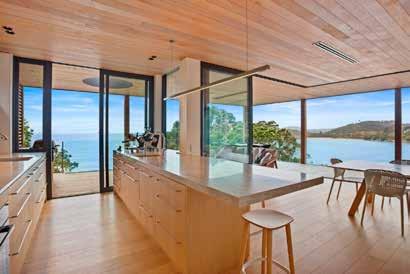






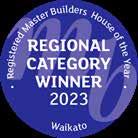




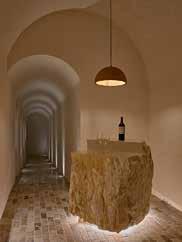






While it may be affectionately known as the ‘family bach’, a stunning home in Cooks Beach has taken out the Supreme House of the Year over $1 million award at the 2023 Waikato Registered Master Builders House of the Year.
Built by SJR Builders, and designed by Hamilton Architects Edwards White, the award-winning home is proof of the outstanding craftsmanship that goes into a project of this calibre.
It’s not a first for SJR, having entered the awards since 2013, the team have picked up many Master Builders awards over the years including Regional Supreme Award three times, the builders coveted Craftsmanship Award twice, Lifestyle awards, Regional Category and Gold Awards. Along with the multitude of local awards, SJR Builders have achieved seven national awards.
SJR company director Steve Ross says entering the awards is a great way to acknowledge the team’s expertise.
“I’m very happy for them to be recognised for the
workmanship and their toil at the coalface,” he says.
“As a company owner, I'm proud of my staff and their workmanship. It’s a collaborative process to actually bring a build to life, and that includes the whole team of subcontractors, the architects and the fantastic owners.”
What makes Steve and the team most happy is the Pink Batts Craftsmanship Award also bestowed on this project.
“The craftsmanship award is something we all go for as builders, so we're pretty happy about that.”
The unassuming street view belies the grandeur and intricacy of this beautiful home perched on a cliff overlooking the ocean.
Spanning three levels, the lower portion uses waterproofed concrete structures, while the upper portion consists of structural steel and
timber framing.
No build is without its challenges and the constrained site access and complex ground conditions on this project were met with a carefully planned and staged building process.
The Cooks Beach home was built over three phases; the first phase was a two-bedroom ‘bunker’ dug into the cliff-face with a tunnel to connect it to the rest of the build.
Boring deep holes of up to eight metres down to bed rock and filling them with reinforced concrete, tested SJR Builders’ expertise.
Navigating the difficult access to the underground concrete bedroom wing required exceptional skill.
Once finished the owners moved in and old bach was removed.
The next stages saw the completion of the tunnel, the lift shaft and then the main

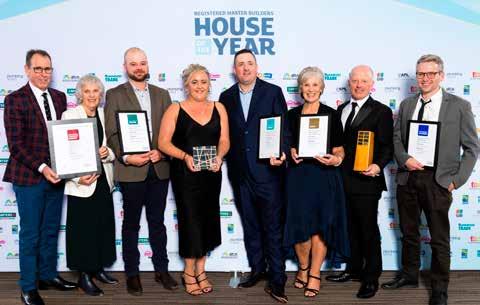
bach was built.
The tunnel is one of the features that Steve gets a kick out of; connecting the ‘bunker’ with the main bach, it was built to provide covered access as well as an element of secrecy.
“It’s a proper tunnel. The owner wanted something that felt really grounded to the earth and that was a really great way to do it.”
Designed with the family in mind, the build is a home of two halves, with the ’bunker’ an oasis for the owners while two upper levels are the retreat for the adult children, their kids and guests.
“It’s a fantastic design for the whole family to use it at the same time but still have their own spaces.”
Outside, stone cladding and paving showcase the skill and attention to detail by the SJR Builders team.
The cedar cladding is beautifully crafted and the door setout is immaculate.
The complex structural steel work and columns are perfectly aligned, and are a testament to the precision and expertise of the team.
Inside, the curved surfaces have been expertly executed, and the finishes including textured plaster, tiling, timber, plasterboard and painting add to the stunning result.

To say the owners are thrilled with the result is an understatement, they are so pleased with their new home
they’ve even invited Steve and his team to stay.
“We're lucky to have great owners, as we do with all our projects, and one of the most satisfying things is for my staff and myself to be offered the use of bach.”
Entering the awards is one of the few ways Steve uses to market SJR Builders.
“It's good to have our name out there and associated with Master Builders and the awards.”
Steve started out working for Stewart Hanna in his company, buying into the business in 1998 and acquired full ownership in 2005.
He purchased the company knowing the excellent and long-standing reputation that Stewart Hanna Ltd had gained over the years.
A name change to SJR Builders Ltd in 2019 was a process undertaken over time and reflects the high regard for the Stewart Hanna Ltd brand.
Steve’s goal with a SJR project has always been to exceed client’s expectations and, while he’s no longer on the tools, he’s involved in the project from woe to go.
“I run the business from quantity surveying, liaising with the clients and architects and bringing it all together. I get the projects going forward and make sure that we deliver what we say we're going to deliver,” he says.
Having that input in a
project from the outset, Steve says, is vital to producing a build that is not only of a high quality but delivers on budget.
“We like to get involved with clients very early on, and we'll work with architects from the outset,” he says.
“It’s a benefit to the client because we've been looking at the plans as they're getting designed for cost efficiency around material and labour. And we actually know the whole project, so when the building consent is finalised, when we start on the job, we’re straight into it.”
SJR Builders work a wide range of residential projects from the minor home repairs to the more complex builds of high end architecturally designed homes.
The beauty of this, Steve says, is the ability to apply the innovative thinking, ideas and products specified by architects and clients on the building site.

Regional Pink Batts
Craftsmanship
Regional Category Winner
Regional Gold
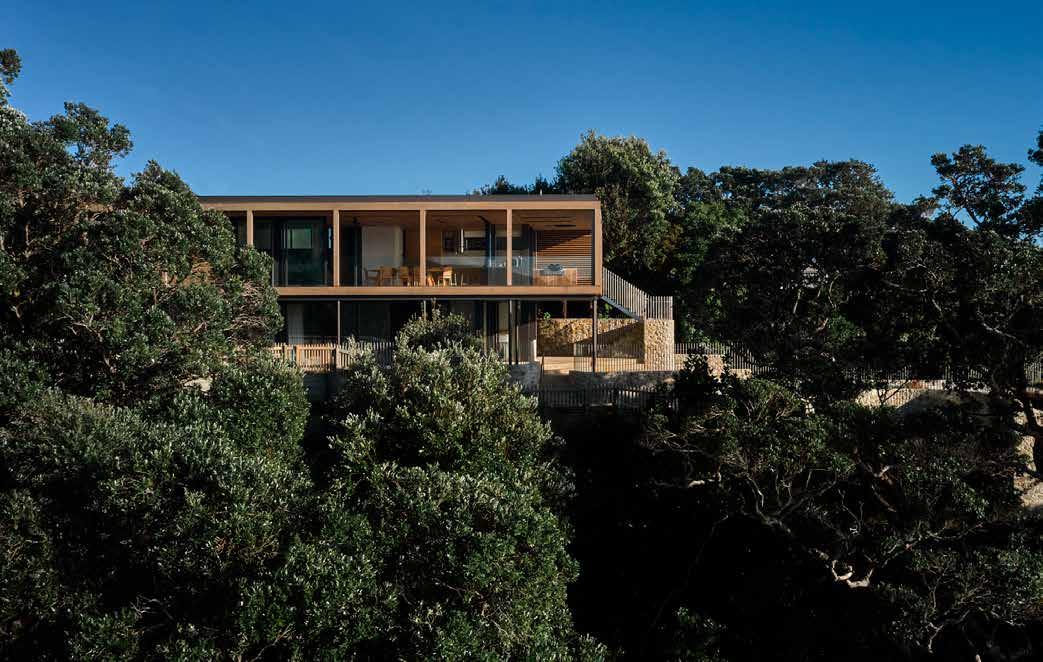
The brief was clear – build a beach house that meets the needs of our multigenerational family where extended families can spend time together whilst each having their own space.
The home is to be made of enduring materials that are natural in their appearance and patina over time. A place with a sense of solidity and permanence, knowing the place will be here for the next 100 years.
Natural timbers and locally sourced stone in the exterior construction and finishing in a natural colour palette,
subtly blends the house with the surrounding environment.
The home consists of levels; garaging, bedrooms, bathrooms and living area on the ground floor with main living areas and guest suite upstairs. Clever design has a dark negative layer at ground level with perforated views through the Pohutukawa tree line. The lightly weighted cedar
box sits at the top, floating effortlessly above the tree canopy, emphasising the abundant panoramic views.
Expansive decks surrounding the home provide outdoor living and extended entertainment areas. The lift moves between the two home levels and also leads to an underground level, including a wine cellar completed in stone. A tunnel connects the holiday home with the beach front hideaway bunker.
- Editorial and images supplied by SJR Builders









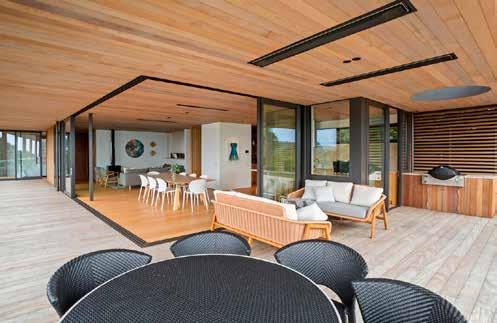
















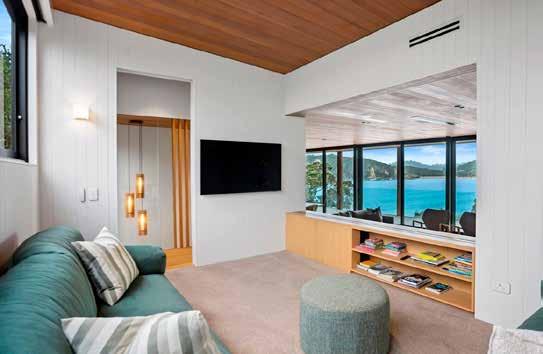

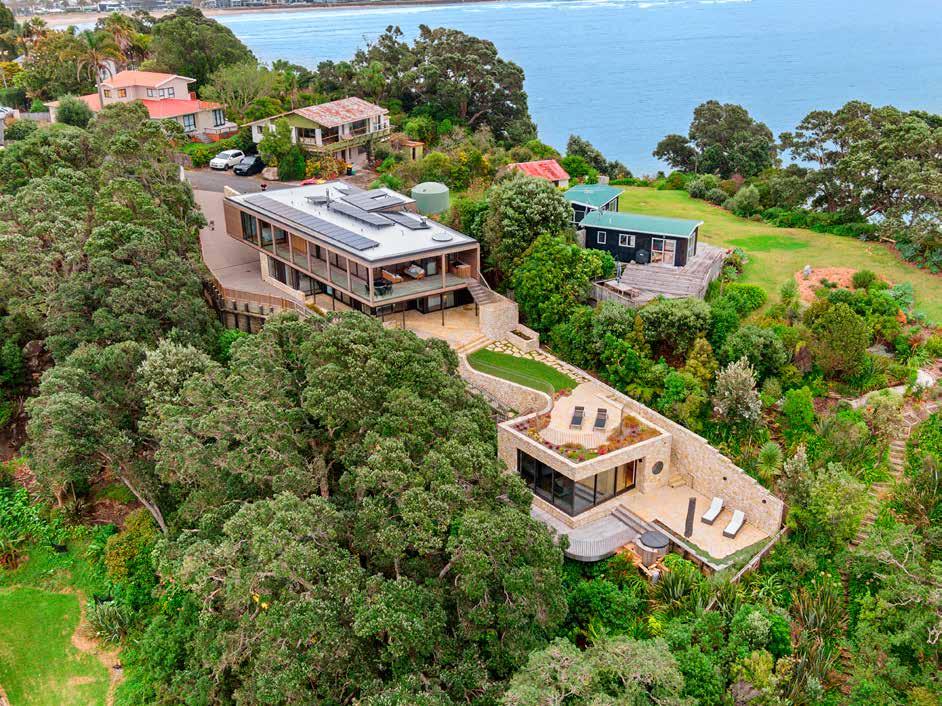
Waikato Registered Master Builders House of the Year 2023
CATEGORY WINNERS
Renovation up to $750,000
GD Pringle Building Ltd - Cambridge
Bunnings Renovation
$750,000 - $1.5 Million
GD Pringle Building Ltd - Cambridge
Altus Window Systems New Home
$750,000 - $1 million
FV Design and Build - Raglan
New Home
$1.5 Million - $2 Million
Holcroft Prestige Limited - Flagstaff
New Home over $4 Million
SJR Builders Limited - Ferry Landing
Volume/Group Housing New Home up to $500k
Versatile Hamilton - Taumarunui
Volume/Group Housing New
Home $500,000 - $750,000
Sentinel homes Waikato - Flagstaff
Master Build 10 Year Guarantee
Multi Unit (Apartments/Duplexes/ Terrace Housing)
Hay Construction - Raglan
GIB Show Home
Fowler Homes Waikato - Leamington
Builders Own Home
A J Gray Building Ltd - Matangi
Gold Awards
Iconic Construction - Matangi
Clark Brothers Construction Ltd
- Whatawhata
Glen Armstrong Builders - Te Aroha
PJ Builders Limited - Horsham
Downs
Davies Homes - Cambridge
Davies Homes - Cambridge
BDC Homes - Morrinsville
Comfortable Home Limited
- Flagstaff


Sentinel Homes Waikato - Newstead
Silver Awards
Savannah Construction
- Cambridge East
White Wood Homes - Morrinsville
Cambridge Homes South Waikato
- Te Awamutu
Cambridge Homes North Waikato
- Chartwell
Design Builders Waikato - Flagstaff
McIndoe Construction - Tamahere
Bronze Award
8 Great Homes - Pokuru
CHT Developments - Queenwood
Jennian Homes Cambridge Limited
- Pukekura
CHT Developments - Te Kowhai
Burns Construction - Flagstaff
SPECIAL AWARD
Pink Batts Craftsmanship Award
SJR Builders Limited
LIFESTYLE AWARDS
APL Sustainable and Environmental Excellence Award
Versatile Hamilton
Plumbing World Bathroom
Excellence Award
Iconic Construction
Interior Design Award
BDC Homes
Kitchen Excellence Award
PJ Builders Limited
Outdoor Living Award
FV Design and Build
PDL by Schneider Electric Smart
Home Award
PJ Builders Limited



are







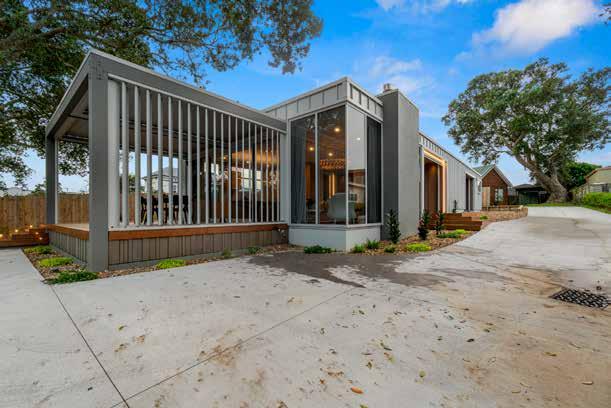










Attention to detail, reliability, and experience
Building beautiful homes for good people to a really high standard has won FV Design and Build the Waikato Supreme House of the Year under $1 million award.
It might sound like a simple catchphrase but it what drives owner/operator Francis Van Den Einden and the team to deliver quality workmanship.
The exceptional home that won the team House of the Year is testament to the flawless design and construction undertaken by the team.
Sitting prettily under two old pōhutukawa trees overlooking Raglan Harbour, this home was built to replace the original and faded family bach.
The compact three-bedroom, two-bathroom, two-living room newcomer makes astute use of the space available in its 173sqm footprint.
Constructed over three levels, with engineered block foundations, it’s an all-weather address lending a gallery-like appeal.
Connecting decks protect from both wind and sun, while a covered outdoor area with louvre roof and walls leads to the kitchen and living area. Inside or out, it’s a delight to behold.
Heated, polished colouredconcrete floors with plywood and cedar walls predominate indoors and frame additional touches.
These include a feature halo light fitting that throws a dreamy, star-studded
reflection on the ceiling. A solid plaster fireplace over aerated stone makes it all the better for lighting up some timber logs to keep this home cosy on cold winter nights.
And when the world-famous Raglan surf’s up, there’s a place to clean up afterwards right at the back door. An exterior shower washes away the notorious black sand.
This home’s stunning design integrates with the sloping site, whilst skilfully crafted recesses and protrusions add character and style to its long rectangular form.
The complexity of the roof, with its well-installed internal gutters and downpipes, further highlights the precision and expertise involved. Inside the dining room,
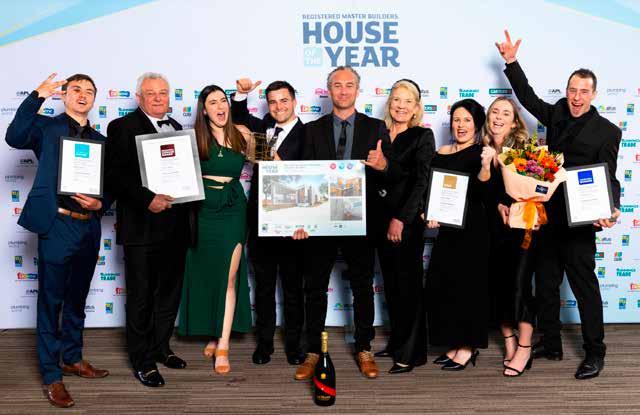
FV Design and Build used cedar on the walls and ceiling, along with full-height wallto-wall doors, creating a feel that effortlessly extends to the outdoors.
A special feature, the hidden floor-to-ceiling door in the dining room leading to the bedroom wing, adds a unique touch.
“The cedar door is a full height panel to look like a secret door, which leads you down the hallway and it came up really good,” Francis says.
The judges noted the team’s outstanding skilfulness shone through making this house well-worthy of the Supreme Award for the category. They also took out the Altus Window Systems New Home $750,000 – $1 million category, Outdoor Living Excellence Award, and a Gold Award for the build.
FV Build and Design has entered the Master Builders House of the Year since 2017 picking up multiple awards along the way.
Taking out Supreme is a
first and, Francis says, an awesome acknowledgement for his team and their dedication to continually producing a high standard of workmanship
“It was extremely special and with so many other great builders in the room, it’s really humbling to have got it across the line,” he says.
“The main reason I enter is to get validation for the team. To be put in front of our peers, and judged by our peers tells us if we're on the right track with the product that we're
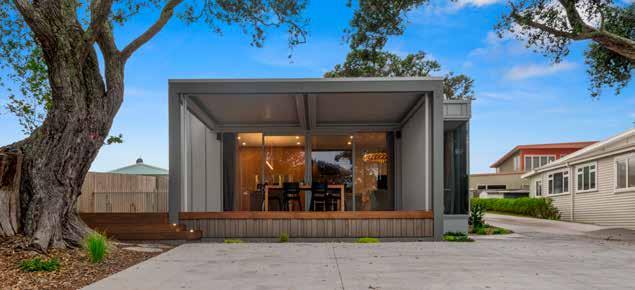

Congratulations to the team at FV Design and Build. We are proud to support and work alongside FV Design now and into the future.
trying to put out and being recognised in front of them is a nice feeling.”
Francis is a trade qualified, licensed building practitioner, and with over 20 years' experience, he’s still very much hands-on and the personal point of contact during an entire FV Build and Design project.
“I'm still on site and you deal with me the whole way through. If you've got an issue, you just ring my number, and you get me. We offer a lot of transparency with what we're doing for our clients and I find this helps during the project.”
The small crew not only work on new builds they do renovations and can assist with the design, and Francis says, they’re a ‘one stop shop’.
“We can do everything from pouring the concrete through to doing the landscaping and building your pool.”
Trained by an old school builder, Francis learnt to do everything from the ground up and it’s the fundamental skills he passes on to his crew that helps them produce high quality finishes.
“I still train apprentices and I want them to learn the whole package.”

Altus Window Systems
New Home
$750,000 - $1 million

Home is where the heart is, and this one — sitting prettily under two old pōhutukawa trees overlooking Raglan Harbour — is a perfect picture of just that.
Built to replace the original and faded family bach, the compact three-bedroom, two-bathroom, two-living room newcomer makes astute use of the space available in its 173sqm footprint.
Constructed over three levels, with engineered block foundations, it’s an all-weather address lending a gallery-like appeal. Connecting decks protect from both wind and sun, while a covered outdoor area with louvre roof and walls leads to the kitchen and living area. Inside or out, it’s a delight to behold. Heated, polished
coloured-concrete floors with plywood and cedar walls predominate indoors and frame additional touches. These include a feature halo light fitting that throws a dreamy, star-studded reflection on the ceiling.
A solid plaster fireplace over aerated stone makes it all the better for lighting up some timber logs to keep this home cosy on cold winter nights. And when the world-famous Raglan surf’s up, there’s a place to clean up afterwards right at the back door. An exterior shower washes away any wayward black sand.
- Editorial and images supplied by FV Design and Build


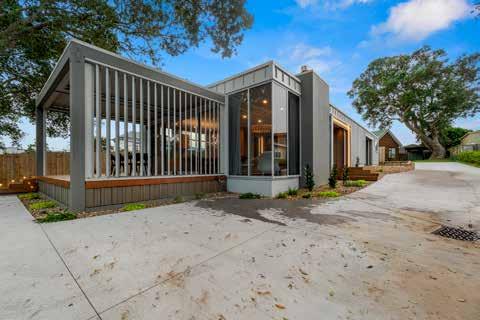

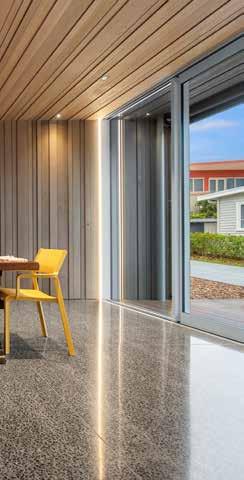
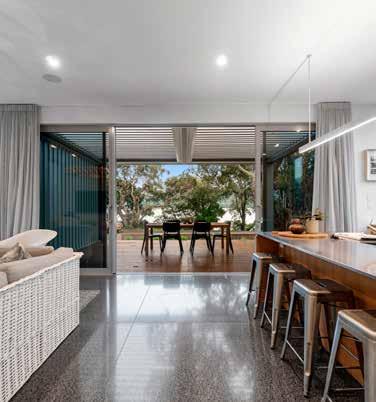









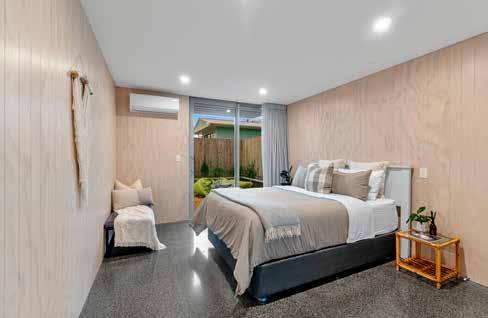


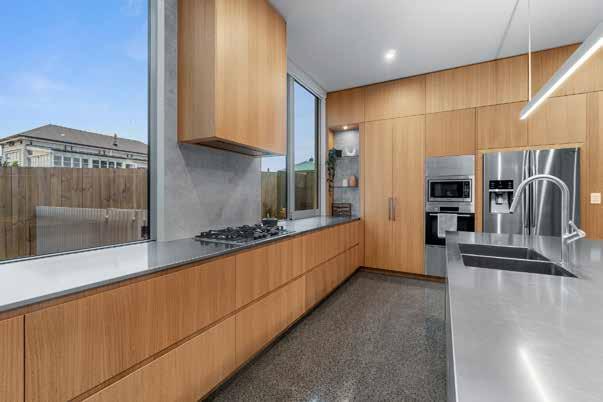










We take great pride in our quality and workmanship. It starts with our attention to detail and we have developed systems and checklists to ensure your job runs smoothly to the highest standard.



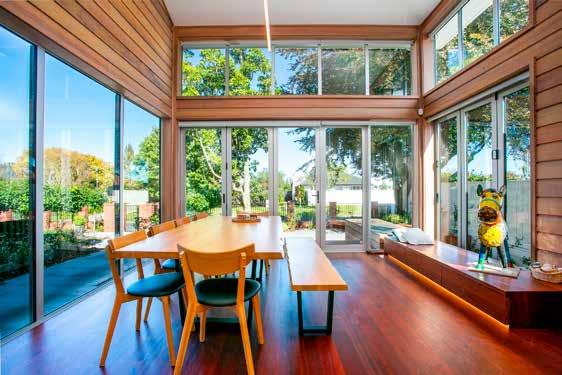

A step back in time has won GP Pringle Building Ltd Supreme Renovation of the Year at the 2023 Waikato Registered Master Builders House of the Year competition.
Winning a Supreme is a first for GD Pringle and managing director George Pringle says entering the awards is a great way to track the team’s craftmanship.
“I like the fact that there's someone else judging our work and making sure we are achieving high standards. I know our team worked really hard to do nice work, but it's nice to be validated from someone else that you're actually doing a fantastic job.”
Once a small 1930s bungalow, the Cambridge renovation pays homage to the past whilst expertly bringing in the new.
The attention to the details of the house’s history was driven by the clients Jo and Richard who were keen to retain the home’s character while giving it the new lease of life.
Jo, an interior designer, is the reason why you’ll see a dedicated effort to tie the old with the new by reusing existing materials, George says.
“It was just an absolute pleasure to work with Jo and Richard, and the reason we have a result today is because of the passion and the effort they put in.”
Reusing existing materials, and sourcing materials sympathetic to the house’s age, including some gems found at Demolition Traders, has helped create a seamless transition from the past to the
present day.
“We purchased some internal doors to match in with the existing. I think it was $1,500 to have the doors remade brand new and it was about 150 bucks from Demolition Traders. While we were there the client actually saw some leadlight windows and we incorporated those into the house as well.”
The leadlight windows added a tasteful sense of charm to the powder room.
The renovation saw a 47sqm extension with a laundry, bathroom, separate toilet and main bedroom ensuite that enabled this house to spread its wings.
Little details like the recycled butcher’s block table re-purposed as an island unit in the kitchen help to tie the old with the new.
Elegant touches throughout the house, like the additional patterned ceiling sheets running down the hallway from the main entrance are a delightful nod to the past.
The creation of matching cornices, renovated architraves and skirtings, and meticulously matching new matai with existing matai flooring showcases the GD Pringle Building team’s eye for detail.
New double-glazed timber joinery throughout the house brings the house into the modern age.
Plus, there’s a ducted underfloor heating and cooling

system and upgraded insulation in keeping with a contemporary, warm and healthy home.
Open plan living adds to the spaciousness of the extension as well as a adding a welcome update to what were once separate living areas.
A home designed for today’s lifestyle is not complete
without bringing the outdoors in and a portico provides a gorgeous all-weather space for entertaining.
Creating a renovation for modern living whilst being sympathetic to the past had its challenges, George says, but the effort, time and energy that went into the project was worth going the extra mile.
“It was just a neat project to be involved with. And the fact that the client was willing to go to those levels, because it would be so easy to cheat out on some of those details but it wouldn't have the same effect.
“You would be hard pressed to work out where the extensions begin and the old house ends.”
NATIONAL AWARDS WON Top 100
REGIONAL AWARDS WON
Regional Supreme Renovation of the Year
Regional Category Winner
Regional Gold


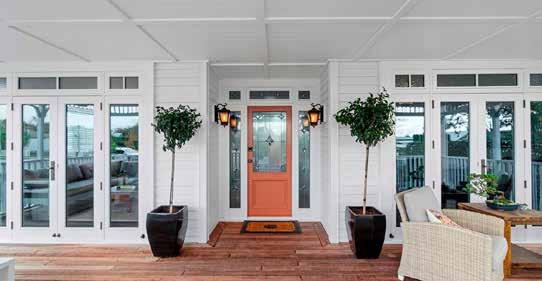
Renovation up to $750,000

Once upon a time it was a cottage. Now this Cambridge charmer is a grown-up version of its former self.
The 47sqm extension has enabled this house to spread its wings, with a laundry, bathroom, separate toilet and main bedroom ensuite contained within the revamped look. It helped that the client is an interior designer: somebody who wanted to retain the home’s character while giving it the new lease of life it needed. That’s why you’ll see a dedicated effort to tie the old with the new by reusing existing materials. Take a look at the recycled butcher’s block table standing proud as an island unit in the kitchen as one illustration of this approach. You’ll see such touches throughout the house. Running down the hallway from the main entrance are extra patterned ceiling sheets. Those internal doors have been here before, in other places. Additional doors have come from a demolition yard, as have the leadlights in the powder room. Concessions to modernity lie in new double-glazed timber joinery throughout the house. There’s a ducted underfloor heating and cooling system and upgraded insulation. And because all grown-ups like to entertain, a portico provides a gorgeous all-weather space.
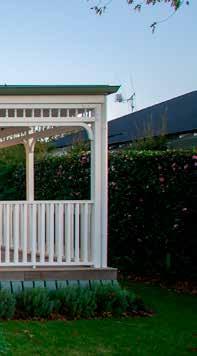
- Editorial and images supplied by GD Pringle Building Ltd


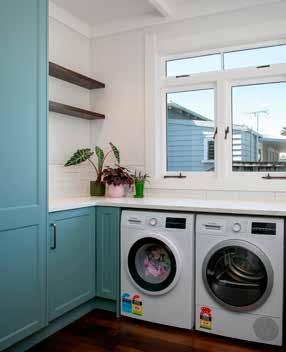
Bunnings Renovation $750,000 - $1.5 million
This much-loved 1970s home needed new life injected into it.
The adult children were returning on a repeat basis, now with their own kids in tow, for family get-togethers. So began the season of transformation. After extensive engineering work, both in the groundworks and to the original structure, the new
shape began to emerge. Out went the dated floorplan with separate living spaces; in came a large open-plan living area for multi-generational enjoyment. A focal point is an alcove with raised built-in hearth and gas fire. Brick slips on the walls and a glass roof complete
the picture. The upstairs main bedroom is connected through an expansive void. Skylights and floor-to-ceiling windows make great use of natural light. A further outdoor room forms a conservatory that serves as a threshold to the garden. This area includes a barbecue and can be opened or screened off to respond to the seasonal changes in the garden. The original kitchen with inbuilt


joinery has been carefully preserved, and a new island unit and cabinetry has been added. In its new guise, the four-bedroom, two-bathroom, two-living room address can be enjoyed by young and old alike.
- Editorial and images supplied by GD

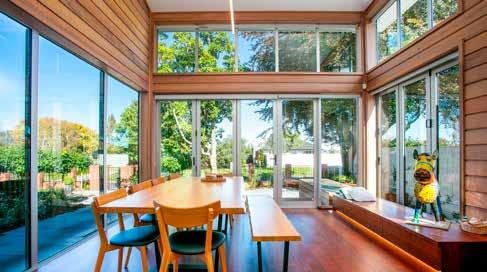

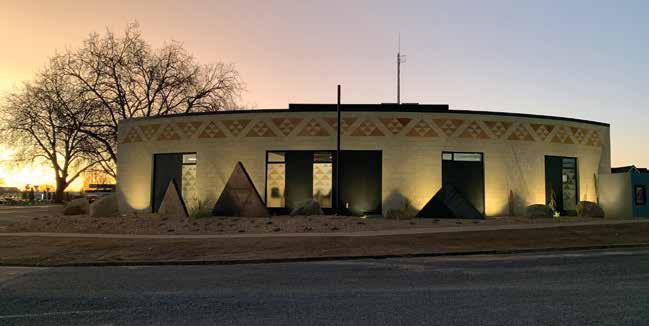






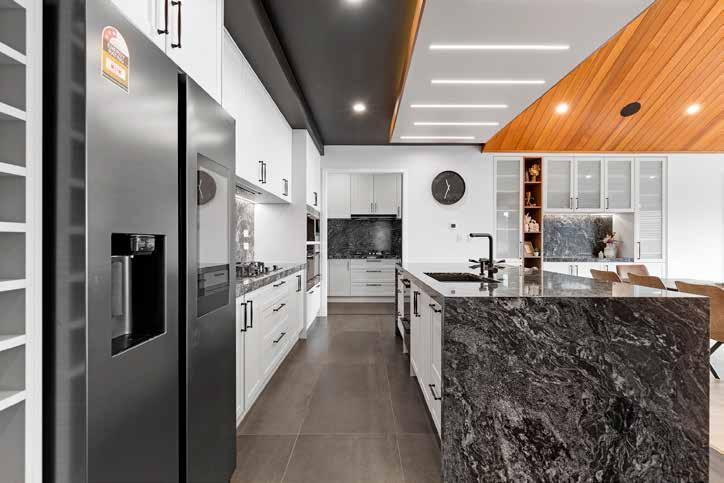

This labour of love showcases this builder's immense talents and craftsmanship. It starts with a grand exterior featuring Abodo weatherboard, plaster and schist.
Step inside through the grand, shiny white front door and prepare to be wowed by the generous lobby and living area, complete with mirrored ceiling. Timber raked ceilings and statement feature walls, combined with a generous use of glass, further illustrate this builder’s singular style. The 294sqm home is big enough to accommodate four spacious bedrooms, two luxury bathrooms and two living areas. A designer kitchen with touches of marble and ample storage space offers all the catering bells and whistles. This is a good thing,
considering there’s a vast landscaped outdoor entertainment area — with spa included — too. A separate laundry and office keeps work and play areas apart. There’s room for two cars in the in-house garage that has its own workshop area, although with local parks and shops nearby, you may want to walk instead. When the need to ride does arise, Flagstaff is just a short drive to the Hamilton CBD, and it has easy access to the Waikato Expressway.
- Editorial and images supplied by Comfortable Home Limited


a ceiling Flagstaff






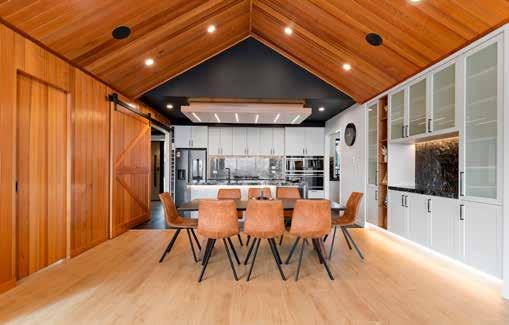













Flora Habitat has more than 10 years of experience in designing and constructing outstanding outdoor spaces throughout Waikato. We pride ourselves on quality service and craftsmanship as well as innovative landscaping creations that transcend ordinary design solutions.




































The site is situated high above a gully with views towards the Hakarimata Range. On all other sides the building envelope is hemmed in and overlooked by the nearby neighbours.
The design responds to this context by using the form of the house to divide the site into various outdoor zones. To the north a sheltered outdoor area opens onto a protected lawn while to the west an elevated deck enjoys evening sunsets and provides openness toward the adjacent gully.
With grown children who have left home, the owners required a house that could be easy occupied by two people with intermittently used guest spaces situated in a separate wing. The layout seeks to minimise unnecessary circulation and allow public and private spaces to exist in close proximity. Privacy between these spaces is maintained by carefully restricting sight lines and forming discretely communicated but discernible thresholds.
The identical gable ends are treated with cedar rainscreens while recessed elements are clad in bagged brick. Each material is assigned a role and used accordingly. Matt grey standing seam roofing and bespoke gutters are carefully detailed to contribute to a clean restrained aesthetic.
- Editorial and images supplied by Holcroft Prestige Limited




Brent Tupaea Laser Plumbing Hamilton East Phone 07 858 4921 hamilton.east@laserplumbing.co.nz www.laserplumbing.co.nz
Brent Tupaea Laser Plumbing Hamilton East Phone 07 858 4921 hamilton.east@laserplumbing.co.nz www.laserplumbing.co.nz
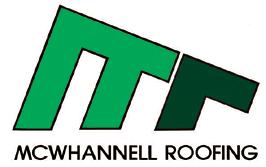



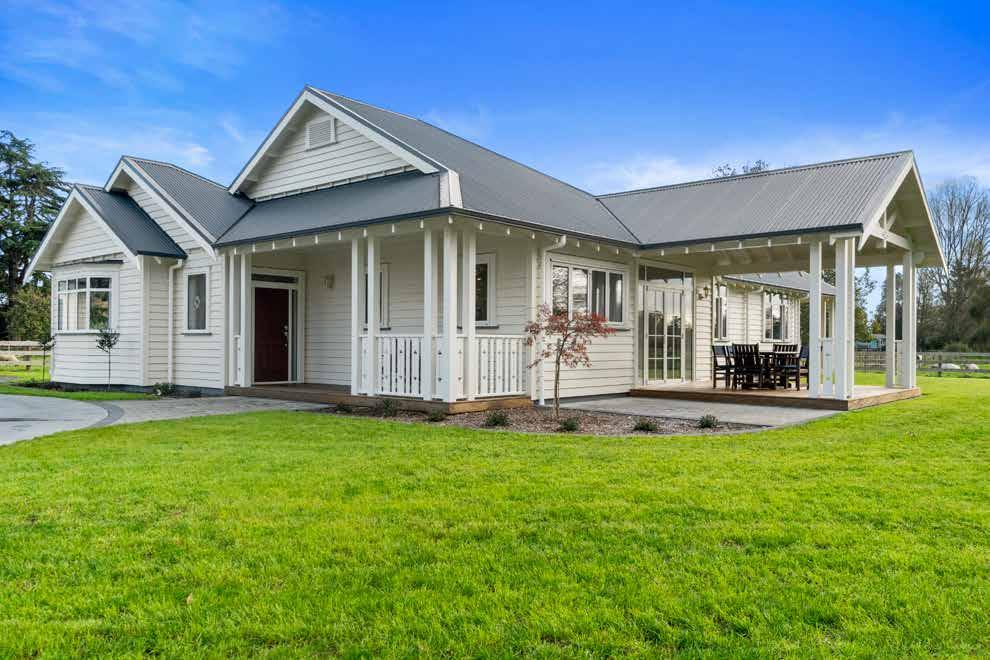





As a local company, we appreciate the character and history of the Waikato and its homes. Whether it's a heritage home in Hamilton, a cozy cottage in the hills, or a family homestead in Cambridge, we want to help to build your story.
Waikato's


At first glance, this charming weatherboard home looks as if it has been part of the landscape for decades.
That couldn’t be further from the truth, however. It’s recently built and perfectly meets the brief of “a new home filled with character and warmth”.
The three-bedroom bungalow-style house with separate garage is intended to be a forever home for the builder and his family.
It also showcases meticulous planning, attention to detail and creative customising — all skills requiring true passion for craftsmanship.
Spread across 198sqm, the house is not the biggest around, but the 2.7m stud
height, wider-than-standard hallway and generous rooms, mean there’s a sense of airiness and plenty of space.
The open-plan living, dining and kitchen is large enough for everyone to spread out.
Custom cabinetry in the kitchen, living room, media room and laundry adds to the bungalow-style charm. Four separate outdoor areas, some covered, allow the family to thoroughly enjoy the rural surrounds.
This dream home has also been built with sustainability in mind. Rainwater is stored,

upgraded insulation has been used and a heat-transfer system installed. This character-filled labour of love is warm in every way.
- Editorial and images supplied by A J Gray Building Limited
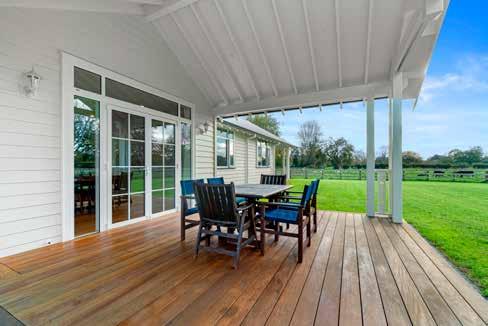
Nick Timms’ journey to starting his Cambridge-based firm Ink Architecture was not a traditional one. Yet, with each new role, he picked up vital knowledge that informs the way he works today.
Even as a child, Nick Timms knew he would one day start a design business. Having a keen interest in design from a young age, he did a landscape design course after leaving school. However, life would have other plans, sending Nick down a winding road of occupations, from roofing to architecture,
that ultimately helped him get to where he is today: Architectural designer and director of his own firm, Ink Architecture.
“I don’t come from a family of business owners, but I always had this inkling that I was going to own an architecture business. It’s been challenging, but it’s been rewarding too, just slowly building up more and more knowledge, gaining momentum and confidence.”
His journey began after a landscaping opportunity fell through, and he got a job as a roofer.
Working on building sites ignited a passion for the design and construction of houses, and Nick often found himself thinking about how he could make spaces better.
From roofing Nick enrolled in an architectural technology course, going on to work for a few firms in Cambridge. However, the global financial crisis hit, redundancy followed and Nick ended up in the timber yard at Mitre10.
“It was actually really cool to learn about timber sizes, timber treatments, how the frame and truss went together, and gain

all that product knowledge.”
After Mitre10, Nick started working for a Cambridge builder, gaining valuable on-site experience. “At this stage, I had a bit of experience with architecture, so I was learning what actually gets done on-site, and then comparing that to what needs to be included in drawings, and how often the builders actually look at the drawings.”
Following his stint as a builder, Nick returned to Mitre10 as a rep, developing his understanding of pricing.
“I started to form this ball of
knowledge and I thought this is going to be really helpful if I ever do go out and do my own thing. That’s what gave me the courage to start thinking about the architecture business venture, and voilà, I started Ink Architecture.”
Ink Architecture takes a collaborative approach to the design process, with both the client and the entire team heavily involved in the development of a project. After comprehensive consultations with the client, where Nick and his team seek to understand the ins and outs of their lifestyle, budget, and home requirements, the team will come together to brainstorm ideas.
“We work really closely with our clients at that conceptual
stage. It’s just a matter of putting all our heads together and coming up with the best possible outcome for both parties, because It’s not just our design, it’s our client’s design as well.”
With the aid of 3D modelling and VR technology, the team are able to create virtual walkthroughs to help clients visualise their project.
After plans and pricing are finalised, the drawings are prepared for building consent, a process managed by the Ink Architecture team. Then, when the build is underway, they conduct regular site visits to assess progress.
“We get on with builders quite well, and because of my background, we can talk the builders’ language.”
Ink Architecture is a boutique architectural design studio based in Cambridge, New Zealand. Comprised of Nick, Druden, Matthew and Greta, the Ink team work collaboratively with their clients to create, design and develop bespoke designs and construction drawings for all types of homes and projects with stunning results.











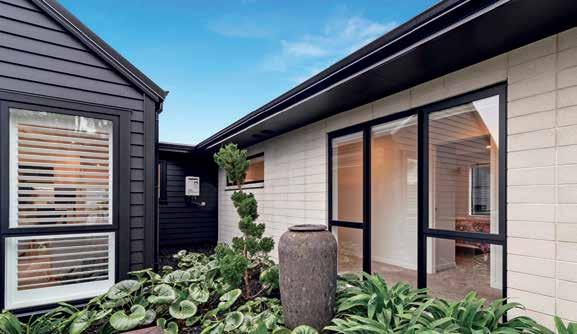




























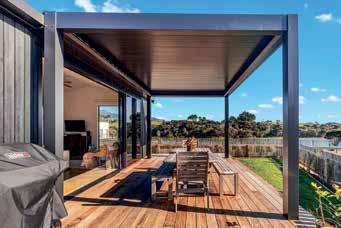



Volume/Group Housing New Home
$500,000 - $750,000
The site might be compact but the home is grand in every sense. And from the moment you set eyes on this address, a commanding presence is evident.
Built to exacting specifications on the city outskirts, this home radiates style and sophistication.
That’s immediately apparent from the reclaimed-brick
cladding exterior, which stamps its impression on the house throughout. A clever design detail sees the use of the same brick carried through the entryway, creating a seamless transition
from the outside world to the warm and inviting interior. Four bedrooms — each of generous size — and two bathrooms are contained within. The main bedroom has its own ensuite and spacious walk-in closet.
There are two living rooms, too, in this 242sqm abode. High ceilings and large windows fill the main living area with natural light, lending a spacious and airy feel, and the elegant kitchen boasts an abundance of custom cabinetry, ample counter space and



top-end appliances. With a substantial outdoor deck, this home is built to accommodate and embrace all seasons. A double internal garage completes the package.
- Editorial and images supplied by Sentinel Homes Waikato




No stone has been left unturned in the pursuit of the best in this builder’s own home in Hamilton.
Let’s start with the sleek and stylish exterior: a beautiful blend of cedar and recycled Italian brick. Inside there are five-plus bedrooms, three bathrooms and two living rooms — all of substantial style and proportions. In the main bedroom, his and hers walk-in wardrobes and a luxe ensuite mean that busy parents can relax and enjoy their own space. Did we mention the state-of-the art media room to kick back and relax? The considerations
continue outdoors, where there’s a sparkling pool and delightful alfresco space. The light-filled interior lends a cathedral-like aspect to the look of this 284sqm modern rural home, located conveniently within cooee of the city. Of course, with all these features at hand, you may not want to venture too far from home. Neutral tones with splashes of blue and blonde timber help this home blend with its peaceful rural surroundings. An oasis for entertainers and

families alike, this epitome of modern elegance offers a perfect balance of style and function whether you want to relax by the pool or make plans for the next party.
- Editorial and images supplied by Sentinel Homes Waikato



With a dedicated team of Joiners and apprentices we produce quality custom made kitchens and joinery with a commitment to detail.





Designed to be an accessible threebedroom home in the urban market, this easy-care 163sqm show home is an inner-city North Waikato haven.
The earthy tones of the brick cladding and coloured steel roofing blend well with the landscaped frontage planted with natives and hardy shrubs. This compact build has a clever configuration that makes the most of light and space.
For instance, the double garage accessed through a separate laundry has handy storage built into the design. The open-plan kitchen, dining and lounge areas are designed for easy family living, with a heat pump situated in the living area to ensure everything’s cosy.
The Mastercraft kitchen is bright and beautiful, with
Scandi timber tones that are illuminated by statement lighting and the large windows in the adjoining dining room. There’s plenty of storage and a seated bar area so family members can chat to the cook or gather for a cup of tea. Sizeable windows in all bedrooms create a sense of space and the two bathrooms each feature a large shower and clever use of LED. In the main bathroom, shimmering aqua-coloured tiling with a stylish alcove shelf beckon for a relaxing end-ofday soak in the bathtub.
- Editorial and images supplied by Cambridge Homes North Waikato






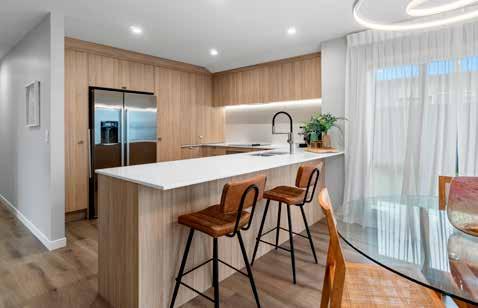











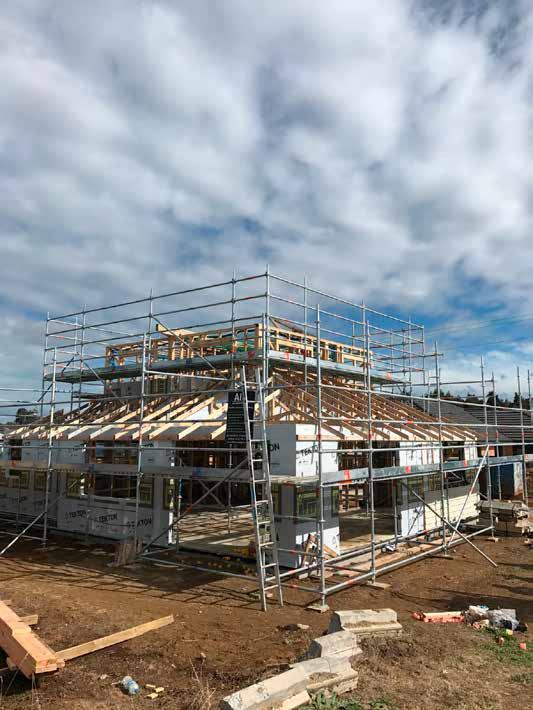



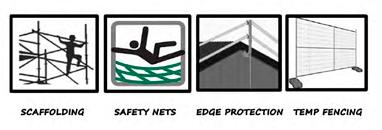

Last month, it was revealed that the Government paid TVNZ to develop news content to promote its political agenda on the topic of climate change.
The Government’s sponsorship, through the Energy Efficiency and Conservation Authority, included the guarantee of several news items covered on Breakfast and Seven Sharp as well as the development of an hour-long documentary.
Sponsored content – news stories that are paid for by a company, organisation or government body to promote their views – is nothing new. However, what was controversial about this sponsorship, was the lack of transparency on the part of TVNZ. Then, when you throw in the fact that TVNZ is 100% government-owned, this situation becomes quite murky quite quickly.
Most of us watching these news items and the documentary or reading other content created by TVNZ under this sponsorship arrangement would likely not have spotted it was paid for by the Government and, thus, contained messages it wanted proliferated.
If and when media outlets fail to be 100% overtly transparent about sponsored content, this will only serve to erode our trust in the media in general.
Each year, international public relations firm, Edelman, releases what they call
their Trust Barometer. Quoting from the 2023 Acumen Edelman Trust Barometer: “In terms of sources of trusted information, traditional media is still the most trusted in New Zealand closely followed by search engines. [However], worryingly, media is seen as a source of false or misleading information more than a reliable source of trustworthy information...”
Sponsored content absolutely has a place in media. However, it’s important that sponsorship is disclosed ethically, with honesty and transparency.
Adjacent to the topic of non-disclosure to sponsored content, what should be equally worrying to you and I is the rise in media bias.
Traditionally, the news media has played the key role in society of shaping public opinion and driving discourse. We rely on good journalism to report facts, as well as diverse opinions, that allow the public to make informed decisions while holding community, corporate and political leaders to account.
While media bias is nothing new, the proliferation of social and digital media, has amplified media bias around the world. Additionally, the

BY HEATHER CLAYCOMB
Heather Claycomb is director of HMC, a Hamilton-based, award-winning public relations agency.
changing face of media has seen the rise of corporate ownership, a drive to sensationalise to gain ‘clicks,’ shrinking newsrooms and technological advancements that have impacted bias.
So, how do we know if what we are seeing is paid or unpaid, biased or unbiased, true or inaccurate?
The short answer is that it is becoming increasingly difficult. If you work in or around the media, then you are hyper aware of when a story is paid by its source. But even when the word ‘sponsored’ sits alongside a story, many people would not know what that means or would disregard it.
The reality is that every one of us needs to take responsibility to uncover biased opinions and get to the truth behind the news. Here are five ways you
can do that:
1. Fact-check. This is increasingly important as brands and some media start to rely on generative AI, which is inaccurate at best. A great fact-checking site I consult is Snopes. com, but there are many free fact-checkers available online.
2. Be a sceptic. Cultivate a healthy scepticism toward the information you encounter in the media and online. Consult different sources to get closer to the unbiased truth.
3. Diversify your media diet. Get in the habit of reading several different news sources. Don’t rely on just one. If you’re reading an international news story, check out what National Public Radio in the US, Associated Press or Reuters are saying about it. These three outlets have been shown to be the least biased and most accurate worldwide by Ad Fontes Media. Check out the ‘interactive media bias chart’ on their website.
4. Spot sponsored content. Again, sponsored content isn’t ‘bad.’ There are a lot of great stories in the media that are paid. However, it’s important to consume these items with the understanding that it is biased toward what the funder wants you to know. Paid content will normally indicate such with the word


‘sponsored.’ Paid posts on social media indicate it’s paid with the words, ‘sponsored post,’ or with the hashtags #ad, #gift or #spon.
Over $750,000 NZD in funding up for grabs for small businesses globally
Coinciding with Xero Day 2023 - the day of Xero’s founding 17 years ago - Xero, the global small business platform, announced a new global small business fund with more than NZ$750,000 in funding, to support the future aspirations of small businesses globally.
Designed to celebrate small businesses, empower success and accelerate their growth, the Xero Beautiful Business Fund Xero is open to small business customers in Australia, New Zealand, Singapore, South Africa, the United States, Canada and the United Kingdom.
Customers in each country will be eligible to apply for the following funding categories that best suit their needs.
• Innovating for sustainability: For small businesses who want
to take the next step on their sustainability journey. It could be to move to sustainable packaging, implement energy-efficient equipment or carbon neutral transport.
• Trailblazing with technology: For small businesses seeking to take the next step to supercharge their business by digitalising parts of their operations or integrating new emerging technologies.
• Strengthening community connection: For small businesses or non-profits striving towards community connection. It could be to contribute to philanthropy, social good, or make an impact on the community in a meaningful way.
• Upskilling for the future: For small businesses seeking to support upskilling for themselves or their employees so they can access training and development to further grow.
For each category, there
5. Demand transparency. Call it out when you know there’s a bias, inaccuracy or a sponsor behind news stories that hasn’t been disclosed properly.
will be seven regional winners identified by a regional judging panel. The pool of regional winners in each category will then be evaluated by a global judging panel and the winner of each category will receive an additional global prize.
Xero CEO Sukhinder Singh Cassidy says the Xero Beautiful Business Fund is an opportunity to allocate funds to back small businesses to help them achieve whatever success means to them.
“We believe small businesses run the world and as champions of small business, Xero is providing an opportunity for customers to apply for funding to take their next step. Whether that be to support a passion to become a more sustainable business, upskill employees, philanthropic work in the community, or integrating the latest AI into their business, the fund is here to help small businesses meet their dreams.”
The application, inclusive of a written form and a short video submission, will be available until 6 October 2023. Information on the Xero Beautiful Business Fund can be found at xero.com/ beautiful-business-fund.
Mandatory isolation for Covid-19 is no longer required. However, the Ministry of Health’s guidance is that people should selfisolate for at least five days if they are unwell, or they test positive for Covid-19. The obligation for the wearing of face masks for visitors to healthcare facilities has also been removed.
In summary, the changes which came into effect from 12.01am Tuesday, August 15 mean that all Covid-19 requirements have been removed and are no longer in place.
Covid-19 Leave Support Scheme (LSS)
The Covid-19 Leave Support Scheme also ended on August 15 and associated payments will no longer be available through the Ministry of Social Development for employees who tests positive for Covid19 after this date.
What Do Employer’s Pay Employees Who Have Covid-19?
Alternatively, if the employee has exhausted all of their paid sick leave entitlement, or have no entitlement available, then they may need to take unpaid sick leave, unless of course they are still fit enough to be able to work and can work from home.
An employee who has tested positive for Covid19 should not be permitted to work at the employer’s premises because there is a risk of spreading the virus further. The employer and the employee may need to consider what the available options are:
• Taking paid sick leave;
• Taking unpaid sick leave;
• Working from home (if the employee is able to);
• Taking sick leave in advance of entitlement;
• Annual leave by agreement.
If an employee has Covid-19 and is unable to work, then usual considerations relating to sickness and the taking of sick leave apply. This means if an employee has paid sick leave entitlement available, then they should utilise that in the first instance.
Can Employer Request a Medical Certificate?
Yes, an employer can request that an employee provide a medical certificate to support any period of absence for sickness, including Covid-19 at any time. There are rules relating to who pays for meeting expenses associated with obtaining a medical certificate in terms of paid sick leave entitlement under the Holidays Act 2003, which may need to be considered.
Alternatively, an employer may require an employee to produce a medical certificate at their own expense for any sick leave taken outside of their paid sick leave entitlements under the Holidays Act. However, an employer should have contractual provision under the terms of an employee’s employment agreement which makes this clear. Namely, wording that says if the employee has exhausted
Hamilton law firm Grayson Clements has promoted four of its legal staff to new positions within the firm.
Elizabeth Hussain and Donna Gifford have been promoted from associates to senior associates, and Philip McHugh and Emily Schwikkard have been promoted from lawyers to associates.
Director Andrew Clements says the promotions are an exciting step forward for Elizabeth, Donna, Philip and Emily and for the firm itself.
“Our promotion pathway is very much about recognising our people not just for their technical skill and excellence, but also their leadership potential, character and relationships with clients.
“We’re very proud to recognise the efforts of Elizabeth, Donna, Philip and Emily, and congratulate them on their very well-earned promotions here at Grayson Clements.”
Philip McHugh’s legal passion is in tech, coupled with an expertise in corporate structuring which has seen him
pioneer legal agreements in complex sectors involving digital enterprise, cryptocurrency and NFTs. Philip works with clients to understand their drivers and develop solutions that protect their interests both now and in the future.
Emily Schwikkard specialises in general civil and commercial litigation and has experience in novel estate claims, significant trust matters and insurance matters.
She has a calm and pragmatic approach to dispute management of all types and works closely with a wide network of Barristers and other professionals to deliver results.
Elizabeth Hussain is a specialist property and finance practitioner, and regularly advises institutional, commercial and high net wealth private clients. Elizabeth’s motivation is client relationship management and building a team to understand and meet client needs.

all of their entitlement to paid sick leave, then the employer may require them to produce a medical certificate at their own expense for unpaid sick leave. EAL’s employment agreement builder on the Employers Toolbox has this particular clause available. Outside of this wording, then the employer should pay associated costs in terms of the employee providing a medical certificate in the event the employer requires one.
The Ministry of Health still want RAT test results to be reported. As before, submissions of positive results will receive an SMS acknowledgment from the official 2328 or 2648 numbers to confirm the positive result.
An employer could accept evidence of this as proof of that the employee has Covid-19, thus saving the expense with
requiring a medical certificate and additional pressure on the health system, i.e. time and resource in terms of providing a medical certificate.
Report RAT test results at https://covid19.govt.nz/ testing-and-isolation/ if-you-have-covid-19
From Employers Assistance Ltd newsletter – employers.co.nz
Donna Gifford has a core focus on residential conveyancing. Donna is a Fellow of the New Zealand Institute of Legal Executives with more than 15 years experience in every type of conveyance. Her clients benefit from her extensive experience and her interaction with the team which also makes her a key link between Grayson Clements’ property clients and the wider legal team.
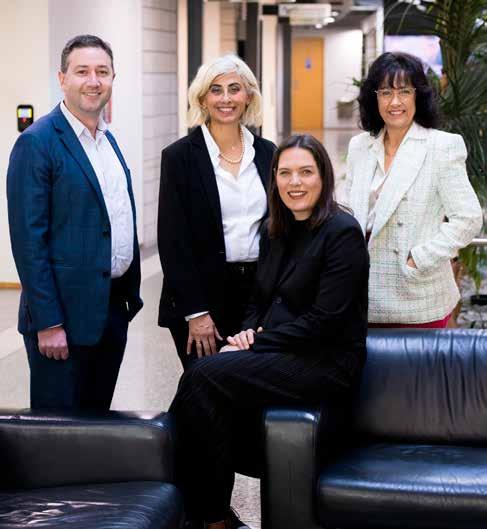
Grayson Clements was established in 2008 by
and
Clements, who both had a desire to grow a firm that focused on designing
delivering results and protecting people. Their work and reputation have gained traction and their client base has grown organically to a point where they now have a team of 25 staff across a range of practice areas.




Over half of NZ parents won’t allow children to use AI for schoolwork and only 46% trust school technology policies and online security measures. Nearly two-thirds of Kiwi parents worry children post things on social media that could impact them later in life.
Large language models like ChatGPT have captured the world’s attention in the past months for their impressive ability to craft short stories, write poems, and provide human-like answers to questions in seconds, have been presenting a new technology-related dilemma for parents in New Zealand.
A new survey from Norton, a Cyber Safety brand of Gen, has found that Kiwi parents, many of whom already feel their children are too addicted to screens, now face a new challenge from AI chatbots—the ease at which they can be used for completing schoolwork.
Over half (51%) of New Zealand parents with school-aged children between 4 and 17 said they would not allow or trust their children to use AI to complete schoolwork.
However, nearly 2 in 3
respondents (59%) with children under 18 years of age said their children go online independently, for either fun or education. This could make it challenging for parents to monitor how their children are using the internet.
Furthermore, only 46% of all respondents with children 17 years or under trust school technology policies and online security measures, while 36% of parents with school-aged children believe schools are not doing enough to educate and protect children from online threats.
“I wouldn’t want my children to use AI tools to do their homework, because answers can come too easily, and I worry they won’t learn to become independent thinkers. But it’s almost impossible to prohibit them from taking the easy way out because to be
fair, who wants to spend hours putting in the grind when a pretty good response is produced within seconds from the glut of AI tools?” Dancing with the Stars digital content creator and professional dancer Nerida Jantti says.
Apart from worries about how AI may be misused by children, parents are also concerned about other online risks, including:
• 50% are worried their children are exposed to inappropriate content
• 44% are worried they are being befriended by someone online who is trying to scam/manipulate their children (e.g., grooming)
• 43% are worried about cyberbullying
• 31% are worried about their children getting addicted to the internet/ social media
Even though parents are concerned about online risks for their children, 69% of respondents are confident they know enough about online safety to keep their families safe. This confidence is perhaps reflected in how Kiwi parents place a premium on privacy even whilst they share their children’s lives on social media.
Of the 30% of respondents with school-aged children who post photos of their kids, 58% are careful about features in the picture that identify the school, and 70% are careful about things in the picture that identify their children’s home. 87% of respondents who post photos of their children online use privacy settings, and 85% of respondents who share photos of their children online have strict privacy settings on their social media accounts to ensure they share only within their network.
Of the parents who have posted photos of their children online, 80% of them do so on Facebook, 42% on Instagram, and 13% utilise Snapchat for that purpose.
To help parents keep their kids safe and from inappropriately relying on generative AI, Norton recommends parents to:
• Understand: Ask children about how they use their devices. Get involved and invested in their online activities to understand the unique risks they may be exposed to. An open dialogue about safe internet practices can help get kids into a better rhythm of sharing their

online experiences openly, allowing parents to address challenges early on.
of AI tools that are suitable for your children’s age. Set boundaries about when they are encouraged or allowed to use those tools.

• Educate: Talk to your children about the most ubiquitous online threats such as cyberbullying, screen addiction, and grooming, and arm them with the ability to spot these risks. Help children understand the pros and cons of using AI tools for education or fun and have a go at some of these tools together.
• Curate: Curate a variety
• Take charge: Install safeguards such as cybersecurity software on digital devices at home. Cyber safety plans such as Norton Family and Norton 360 Premium offer a range of features to help parents monitor their children’s Internet usage and help keep everyone’s data and devices safe.
amilton has two Kip McGrath Centres that provide quality tuition in Mathematics and English, including NCEA level one and two.



students improve their literacy. As the student gets older, they have more input into the content of the lesson. This tailors tutoring to their needs and increases engagement,
Hamilton has two Kip McGrath Centres that have been providing excellent up to date and relevant tuition for over 20 years. They offer individual learning programmes tailored to the specific needs of each student as identified in the initial free assessment.
The goal is to help students succeed in class, no matter if they are the dux or one who really struggles such as dyslexic students. We do this through personalised tutoring sessions, and which include plenty of one-on-one attention by trained qualified teachers.
ensuring the time with us is well used.
Free assessments can be made online at kipmcgrath. co.nz or by ringing 07 848 2262 Help your child now.
Mathematics, English, spelling, reading, and writing are taught, including NCEA math and English. Programmes are modified as children achieve their goals,” Kip McGrath principal Paul Kelly says. “Our goal is to help students succeed in class. We do this through weekly 70--minute tutoring sessions that are personalised for every student and include one-on-one attention.”
Students quickly develop a sense of achievement and discover learning is not only successful – it’s enjoyable too. They also have many students who just work online from home in a live tutoring session.
Kip McGrath teachers tailor the programme to the specific needs of each student as identified in the initial free assessment.
Students work within a supportive, small group setting run by trained qualified teachers. “They quickly develop a sense of achievement and discover learning is not only successful – it’s enjoyable too,” Paul says. They also have several students who just work online. This has grown since the lock down and will be a growth area for the centres.
The sessions feature a mix
The sessions feature a mix of books, worksheets and computer activities providing the variety that a student’s brain needs to keep engaged, motivated and learning. Some of our teachers are well trained in structured literacy and use this training to help
of books, worksheets and com puter activities providing the variety that a student’s brain needs to keep engaged, moti vated and learning. As the stu dent gets older, they have more input into the content of the lesson. This tailors tutoring to their needs and increases engagement, ensuring the time





The Hamilton residential property market continues to feel the effects of constrained listings coupled with a ‘wait and see’ attitude from both buyers and sellers which may linger until after the October general election.
Lodge Real Estate managing director Jeremy O’Rourke says there are five key variables impacting the Hamilton property market, which is triggering caution among buyers and vendors alike. These include limited stock, potential government policy changes, investor inactivity, interest rate uncertainty and the impacts of both immigration and emigration.


“The most immediate variable impacting Hamilton’s market is that prices are still under pressure to rise due to
the limited housing stock we have available in the city. The number of homes for sale in Hamilton at the beginning of August was sitting at around 640, a big drop from the figures in April and May which were in excess of 900.”
While historically listings dip each winter, this July was especially quiet and could point to the uncertainty the market is feeling as we head into the general election, says Jeremy.
“Buyers will be looking to see what policy changes will be coming. Plus, we may see the return of investors back into the market, a group that has been largely absent due to interest rates rising, the lack of deductibility, and an increased Brightline test.
“We’re also seeing people emigrate, moving to greener pastures, with Australia being the most obvious choice. So, while there is currently demand in the market, that could swing the other way entirely if there’s a mass exodus post-election. Conversely, immigration into the country, and specifically into Hamilton, does remain strong. So, that will help to balance any

population exits.”
Jeremy says that while housing demand in Hamilton remains steady, the city is unlikely to see a positive impact on various market indicators, including any price rises, for about two months’ time.
“What typically happens just before prices start to rise, is we start getting surprised by what individual properties are selling for, which is what we are seeing now. So, that’s a positive, early indicator of change that could be
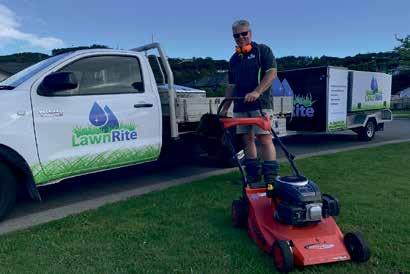

coming for the Hamilton market. There’s every indication now that in two months’ time we could see house medians and averages start to rise.”
However, he says the months preceding the election will continue to bear some uncertainty, particularly as housing supply remains constrained with vendors holding tight.
“So, it’s a case of waiting and seeing just which variables will play out in order to gather some certainty toward the end of the year.”

Founded in 1948 and incorporated in 1973, Foster Construction Group Limited (Fosters) celebrates 50 years in 2023.



















































































































































































‘More than just a construction company’
Started in the 1950s by a father and son, Les and Graham Foster, Fosters has become an iconic, award-winning, multi-million-dollar company, employing over 200 people across their Waikato and Bay of Plenty teams.
Their ongoing success comes down to a leadership decision for Fosters to be ‘more than just a construction company.’
“It’s the people who make Fosters great,” says Fosters CEO, Nigel Sun. “And that’s a statement I genuinely believe in. When you look at our his-tory, it’s about people, com-munities and going above and beyond.
“In 2023, we celebrate our strength as a team, working hard to deliver on what we all believe is a meaningful vision: great communities through strong foundations.
“To do this, we live and breathe our fundamental val-
ues of leadership, relationship, passion, and integrity.
“This means that we willingly take a leadership position to make things happen, we recognise that relationships are fundamental to delivering on our purpose, we’re passionate about the construction industry and we can be relied on to do the right thing.
“These values have provided a pathway for how we operate and for the kind of people we attract to work here. ‘The Fosters Way’ is what sets us apart.”
Offering services in construction, property development, engineering and property maintenance, Fosters not only deliver quality buildings, they can add value to property for years to come.
Part of Hamilton’s history
The Trade News observed in 1995: ‘Foster Construction had its beginnings in Morrinsville in the 1950s, moved to Hamilton in the 1960s and
has been writing its signature on Hamilton and parts of the Waikato ever since.’
From schools to hospitals, warehouses, office blocks, lecture theatres, performing arts centres, St Mary’s Cathedral on Grey Street, to the Claudelands Event Centre –Fosters have left their mark. Their latest iconic developments include Union Square and the Waikato Regional Theatre in the Hamilton CBD. Where community comes first
After construction, Fosters is best known for community building. They look after their business partners and purposely engage local contractors wherever possible.
Key Fosters sponsorships include the Waikato Chamber of Commerce Business Awards, Chiefs Rugby and Northern Districts Cricket. Through the Fosters Custodian Trust, the Foster500 has donated more than $200,000 to the local community over the last 7 years. This money
is channelled through Fosters staff into sponsorships or donations of their choice.
‘Placemaking’ is their legacy, too. A buzz word in the 1990s, placemaking was about transforming public space to strengthen the experience and connections made between people and place, creating lifestyle and business opportunities. Both Hamilton Gardens and Downtown Plaza were examples of this. Today, Fosters develop team continues this theme, with recent projects including Lakewood in Cambridge, Tamahere Village and Omokoroa Village in the Bay of Plenty.
Committed to sustainability
Sustainable development, which the Hamilton City Council coined in its 2001 annual report as “development which meets the needs of the present without compromising the ability of future generations to meet their needs” became core to Fosters operations early on.
Fosters have been members of the New Zealand Green Building Council (NZGBC) since its inception in 2005. And since 2010, they are the only construction company in New Zealand to hold both Toitu carbon zero and enviromark diamond certifications.
Leadership and succession
Strong leaders founded the business, carried it through several recessions, grew the company into what it is today and are now shaping the leaders of tomorrow.
Fosters offer a clear career pathway, with future leaders selected and trained through a customised 3-tier leadership programme, developed between Fosters and Wintec.
Fosters new tagline ‘building with purpose’ reflects how they operate and what’s important to them. Marking 50 years is just as important to management as planning the next 50 years is.
“Fosters have indeed
become ‘more than just a construction company’,” concludes Nigel.
We have a legacy to be proud of and we are set on being part of the future.
I believe we have the right people to take us forward and the vision to succeed.
Given the current economic environment, an official celebration of this significant milestone has been postponed.
The Registered Master Builders Association’s annual State of the Sector survey has revealed that while the building and construction sector continues to face significant challenges, there are encouraging signs of underlying resilience in the sector.
Released at this year’s Constructive Forum, the survey identifies the biggest challenges and opportunities facing the sector. For the first time, the survey explored both the supply and demand sides of construction. Over
1,200 sector participants and homeowners who had built or completed a significant renovation in the past three years responded to questions about their experience building, the economy, critical issues they were facing, and their outlook for the sector.
about the survey results. “This is a sign of underlying resilience in the sector, with many having strong order books and consent numbers remaining high. There is still demand across the sector, especially so in the commercial construction sector, where the pipeline remains incredibly strong.”
challenges facing the sector, all an increased proportion on the year prior.
“While these issues were also felt keenly last year, they are significantly more accentuated in this year’s survey. Additional costs and project delays are the consequence of the pressures facing the sector, and in turn these are causing a rise in the number of customer complaints and disputes,” Kelly says.

A key result from the survey revealed that while 79% of sector participants think the economy will deteriorate over the next 12 months, only 31% of builders think their own businesses will be worse off.
This sentiment was shared by homeowners, with the survey revealing that nearly half (45%) of all homeowners stating they would recommend building to others in the current environment.
Our team is Consistent, Reliable, Professional & Considerate
Master Builders chief executive David Kelly is optimistic
The survey also revealed that the sector is still confronted with ongoing challenges. Cost escalation (96%), supply chain disruption in concert with product availability and increasing product substitution (95%), and skill shortages (67%) were identified as the three most critical



“Finding skilled staff also has appeared in the top five issues every year since we began constructive seven years ago. What is reassuring is that apprentice numbers are increasing, and more of those surveyed are taking on new apprentices than ever before.”

to bring in the skilled people they need. The current immigration settings are seen as being too complex, cumbersome, and time-consuming to navigate.

some fast improvements to help the system now, while the full review takes place,” Kelly says.

Our team is Consistent, Reliable, Professional & Considerate
Almost 60% of respondents say it’s harder to get the staff they need than it was 12 months ago. This builds on last year’s results where 66% of respondents were already finding it harder to get the staff they needed than in 2020. Of those looking to bring skilled labour into the country, only 7% say the current settings are allowing them to bring in the labour they need. 31% are bringing people in, but with difficulty, and 62% are not able


Consenting continues to also be a significant issue for the sector, with 80% of respondents reportedly impacted by consenting delays, which is consistent with last year.

“Consenting is an area where some quick wins could save the sector considerable time and costs – both sector participants and homeowners are reporting the cost increases and disruption caused by unresponsive consenting processes. While we are pleased to see this is on the Government’s reform agenda, we need to ensure we develop
The survey highlights the impact these issues continue to have on the sectors’ mental wellbeing. 87% percent of respondents noticed a rise in stress or mental health issues in their business over the last 12 months.
“This was on top of an already stressed sector, as seen in last year’s result, in which 88% of people said that stress and mental wellbeing was an issue in their business. We must improve the mental wellbeing of the sector to keep delivering the homes and infrastructure that New Zealand needs,” he says.
Despite these challenges,

there is an opportunity to shape the direction of the current cycle.
“The market may be turning, but we shouldn’t talk ourselves into a deeper downturn. Let’s not underestimate the sectors resilience.
"This is very different to the previous downturn after the GFC, when all work just stopped. This time we still have strong order books, especially across renovation and commercial construction. And the Government is committed to a large civic building programme.
“It is important to remember, if you are in a position to do so – now is still a good time to build. It is also unlikely to get cheaper to build in the future,” Kelly says.

















We’re excited to see how the Waikato is growing and developing, driven by the businesses bringing people to the area, and providing our communities with unique and innovative places to live, work and play. You’re creating a truly world-class region with a bright future. Thank you. You belong here.
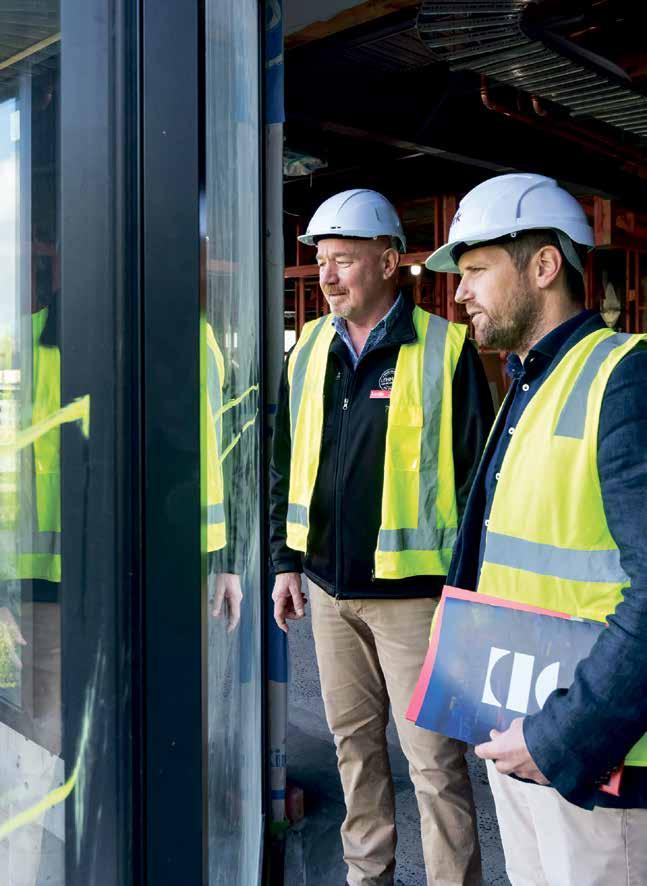
The new Hamilton Blood Donor Centre opened its doors to a state-of-the-art donor centre on the corner of Anglesea and London Street.
Purpose built for New Zealand Blood Service (NZBS) by Hamilton-based Stark Property, the centre will help meet future demand for blood and blood plasma, and better suit the needs of the Waikato donor community.
NZBS CEO Sam Cliffe says an enhanced donor experience was integral to designing the $4.5-million-dollar centre.
“The previous Hamilton Donor Centre on the Waikato Hospital grounds have been an amazing home for NZBS over the past 30 years, but it was time to move into a more contemporary, future-proofed facility,” she says.
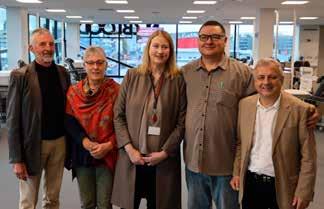
“The biggest change is the newly expanded donor floor, which now encompasses 950sqm. We’ve doubled the number of beds from 12 up to 24, which will allow us to increase our collection capacity in the future. This is absolutely crucial given the ever-increasing need for blood and plasma products across New Zealand.”
the opening of the new, centrally located donor centre will encourage more Hamiltonians to roll up their sleeves.
Every week more than 800 donations are needed in Hamilton.
“We’ve tried to make it as easy as possible for new donors to access the centre,” Cliffe says.
The Waikato currently has an active donor panel of just under 25,000, but in order to keep pace with the demand for blood and blood products, NZBS needs to increase its whānau of donors in the region by 20 percent. It’s hoped that
“There are also now 30 on-site underground carparks and our newly central location is easier to access as it’s within walking distance of the Hamilton CBD and Transport Centre.”
CONTINUED - PAGE 60


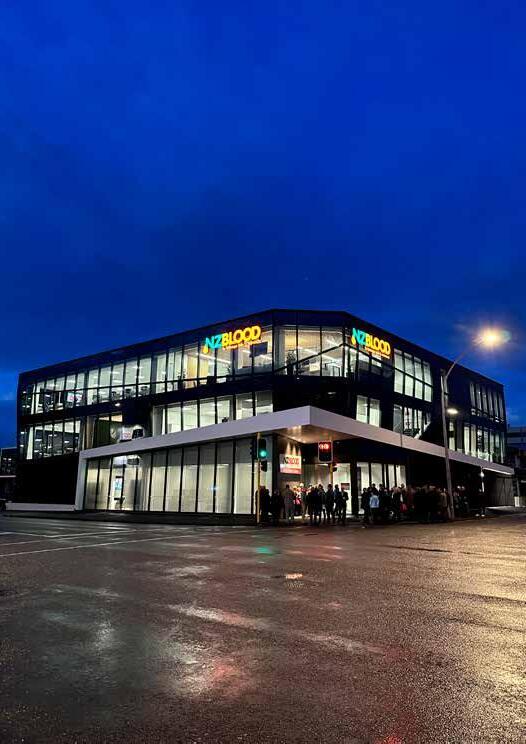



FROM - PAGE 59
The donor centre, developed in collaboration with Stark Property, incorporates a number of sustainable design features including low energy LED lighting, EV chargers in the carpark, and low-flow water fittings. A solar power array on the rooftop generates 20-25 percent of the building’s annual electricity demand and storm water retention tanks will help reduce pressure on council infrastructure during heavy rainfall events.
The opening ceremony included a mihi whakatau led by Te Haa o te Whenua o Kirikiriroa.
Special guests included some of Waikato’s most prolific donors, who have collectively donated more than 1900 times. Tom Davies, with his remarkable 500 donations, was joined by other high-profile donors Mervyn Balloch (358 donations), Koro Amai (294 donations), Justin Vodane (258 donations), and Paul Barnett (230 donations).



“NZBS relies on the generosity of its donors to help save lives, so it’s only fitting that we celebrate the opening of our new home in Hamilton with some of our longest serving donors in the region for whom giving blood or plasma has been a lifelong commitment,” Cliffe says.
In addition to the enhanced donor areas, the new site will also have a logistics area (including a service yard), and offices for National Office and support staff.
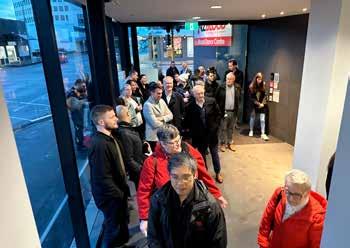







Little did Mikyla Winchcombe imagine when she was in the depths of her cancer journey that she would one day be working for one of the key players in her survival.
Being diagnosed with acute myeloid leukaemia at 21 was not an ideal way for Mikyla to welcome in her twenties.
A blood cancer where excess of immature white blood cells or myeloid line of blood-forming cells is made by the bone marrow, the leukaemia set Mikyla on a journey of repeated chemo treatments and lengthy stays in hospital.
“I had four rounds of chemo at Waikato Hospital and basically, because my cancer was so aggressive, I also needed a stem cell transplant,” she says.
The best bet for a stem cell match is usually a sibling but sadly Mikyla’s brother was only a half match.
“If they couldn't find anyone else from the bone marrow donor registry, they would have used him but it is quite risky to do a half match so then they went to the international donor registry.”
Thankfully a match was found in Germany and Mikyla was able to receive the stem cell
transplant that saved her life.
In New Zealand, blood donors can ask to join the NZ Bone Marrow Donor Registry and an extra tube of blood is taken for tissue-typing tests and entered into a national database.
The New Zealand Bone Marrow Donor Registry is part of a worldwide network of registries which contain over 40 million unrelated volunteer donors and cord blood units.
Now in remission, Mikyla is grateful to all the parts of the healthcare system that assisted in her recovery.
Taking on the role donor relations co-ordinator with the NZ Blood Service provided the perfect opportunity for Mikyla to work for one of the services that kept her alive.
“Each round of chemo wiped out my bone marrow. Bone marrow produces red blood cells that carry oxygen, white blood cells that prevent infection and platelets that control bleeding. The outcome of no bone marrow

for a patient’s life is almost always fatal.”
To counteract this and help get Mikyla strong enough to have the stem cell treatment, she required regular blood transfusions.
“I would need whole blood to top me up every few days. It made a huge difference. On days where my haemoglobin levels were low, I couldn’t get out of bed. The days where I would receive a transfusion would mean I would be able to stand without getting dizzy, have a shower and feel a bit more me again.”
Mikyla’s also required regular platelet transfusion to boost her depleted platelet count.
“Platelets stop you from bleeding out, basically they clot the blood. I would get blood noses and then I'd have a platelet top up and the same process would repeat about every two days and same with the blood. If it wasn't blood one day it was platelets or sometimes it was both when I was really sick, and sometimes twice a day.”
After Mikyla had her stem cell transplant, the donor cells kicked in and took over her immune system, and now her body is producing its own platelets and new red blood cells.
Like many people, before her brush with cancer, Mikyla thought most blood donations were used on accident victims and the like.
“So, for me it wasn't a case of bleeding out from a car accident. It was literally just keeping me alive and every single person on the cancer ward or the haematology ward is the same.”
The NZ Blood Service collects approximately 106,000 whole blood donations, 110,000 plasma donations and 18,000 units of platelets and 26 per cent goes to cancer patients.
“Everyone knows someone who has or has had cancer. So, if that's not a reason to donate, I don’t know what is,” Mikyla says.
Having being on the side of needing blood to now promoting the service to new donors and maintaining relationships
with current donors, Mikyla is in a good place to talk the talk.
“Over the course of my treatment, I received over 70 units of blood and platelets. And not only that, New Zealand Blood has joined forces with the bone marrow registry. For both parts of my journey, the chemo and stem cell transplant, I couldn't have done it without them. They were a huge part of my journey. They literally saved my life. So, it’s very full circle, where I'm at right now.”


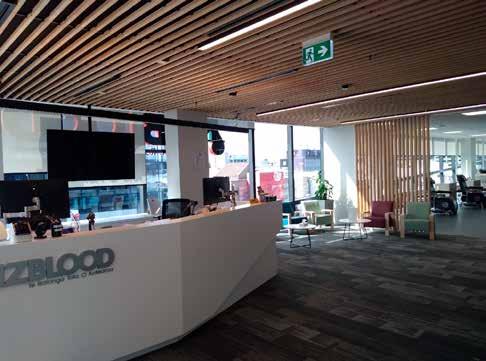



The new NZ Blood Service building on the corner of Anglesea and London Streets in the heart of the Hamilton CBD is opening up more opportunities for people to donate blood.
With 30 underground carparks for donors, extended hours and more donor stations, add to this a swanky new building and donating to this vital service just got a whole lot easier and more appealing.
Donor relations co-ordinators Scott Pearce and Mikyla Winchcombe hope the new building’s facilities will remove some of the barriers that deter people from donating.
“The whole process of giving blood takes half an hour from when you're registering till when you’re eating your chocolate biscuits. You add travel time into that and you can be away for over an hour, and for businesses that’s lost productivity,” Scott says.
“We've got some really awesome businesses that understand the need and that the need is greater than the business’s need and they allow their staff to come out.
“But by being in the CBD,
and with our awesome parking, we are expecting a lot more people and businesses coming in at lunchtime or other times that suit them.”
The move couldn’t have come at a better time for the Blood Service team having outgrown the old building at the Waikato Hospital site.
Taking over the waiting area in the old building to accommodate more donors helped them add another three beds but, Scott says, in the new building they can accommodate 30 donors at any given time.
“We can't wait. The building is just as nice on the outside as it is on the inside. It’ll be great to be in a new environment but also to be closer to, hopefully, new donors. We’ve also got more space to cater for the ever-growing demand that we're experiencing at the moment,” Scott says.
The NZ Blood Service had been based at the hospital for more than 30 years.
Having started life under the auspices of the DHB, the service became an independent entity in 1988 and moved to the building on the corner of Ohaupo Road and Lorne Street in 1989.
Scott says the move to the city was set in motion several years ago when the lease with the Waikato District Health Board came up for renewal.
The old building will be demolished to make way for a new renal centre.
The new donor centre, the largest in the region, has been conceived with the donor at its heart.
Designed to be both sustainable and future-proof to help ensure NZBS is able to continue to meet ongoing increases in demand for blood and blood products, as well as support its commitments as a carbon reduce certified organisation.
The demand for blood and blood products is continually increasing - plasma demand alone grows by 10 per cent every year. The new facility in Hamilton forms part of a nationwide, long-term strategic plan to increase donor beds and resources across the service's sites.
Mikyla says donating plasma and whole blood are


equally important.
Plasma takes longer but can be donated more frequently, whereas whole blood donations, which is made up of red blood cells, white blood cells, platelets and plasma, can only occur up to four times a year.
“Taking plasma is a longer process overall and we have special machines that basically take the plasma and give your red blood cells back. Because you get your red blood cells back you can do this every two weeks. When we take whole blood, you lose so much iron and your energy levels are lower you can only donate every three months.”
Scott is a regular plasma donor and says while it takes a bit longer it doesn’t stop him from working.
“It takes about another 15 to 20 minutes and because there’s Wi-Fi I can even get some work done.”
The plasma is sent to
Australia and is turned into a variety of essential blood products that help cancer patients, trauma and burns victims, pregnant women and those with auto-immune diseases, blood-clotting issues and compromised immune systems.
Just as important are donations from people regardless of how common, or rare their blood type is, Mikyla says.
“People think because they have a common blood type, they won’t need to give blood but because it’s common we need it even more.”
NZ Blood figures show that in New Zealand the two most common blood types are O-positive (38%) and A-positive (32%), while the rarest types are AB-positive (3%), B-negative (2%) and AB-negative (1%).
The need for blood and plasma is constant, and it’s Scott and Mikyla’s jobs to recruit the blood donors who save lives by
keeping the flow of blood and plasma going.
As well as looking forward to moving to the new purpose-built building, the pair hope the new premises, with its accessibility with both parking and to public transport, will entice more people to donate.
And being in the CBD, Scott says, will have benefits for the surrounding businesses.
“We'll have donors coming into the CBD who will visit some of the local cafes and restaurants, and they will ultimately benefit from us being here. It's going to be a great opportunity for everyone concerned in terms of bringing more people into the CBD, which is looking amazing now.”
Visit www.nzblood.co.nz/ booking/ to book a time to donate or take the eligibility quiz www.nzblood.co.nz/ become-a-donor/am-i-eligible/ eligibility-quiz/





While the NZ Blood Service building was an 18-month project, there was a lot of strategic planning that went on long before it even got off the ground.
In the competent hands of the Naylor Love team, this project required some innovative thinking to overcome many obstacles on its journey to completion.
Overcoming construction challenges is something the team thrives on and, as Naylor Love operations manager Dean McGahey, the key to a smooth-running and successful project is in the planning.
Working on a confined site meant the team had to be logistically canny in how they approached the project.
“Often with our sites, you have the luxury of a little bit of a lay down area (for materials). But because this building was built right to the boundaries on all four sides, it was actually quite a challenge logistically. The only place we could put materials was within the building footprint.”
This required meticulous
planning and scheduling to minimise double handling and avoid any delivery vehicle congestion on the busy city street surrounding the site.
Being in the CBD presented its own challenges, Dean says, “working within the conditions of the resource consent and district plan required us to be being overtly aware of our impact in the city.”
“There are apartments in close proximity and we were very respectful of the surrounding residents and businesses, and the impact that our construction activities would have on their living and business operations. We had to work pretty closely with council and the utilities companies just to make sure that we were managing the street and the busy intersection at all times, and keeping utilities live to the surrounding neighbourhood.”
Minimising those

disruptions comes back to the planning that the Naylor Love team do so well.
“There were minimal road closures and that takes a lot of planning involving numerous contractors working with Naylor Love to develop methodology and plan sequencing to make sure we absolutely reduce the inconvenience to traffic and pedestrian flows.”

And, of course, in any construction project, no matter the size, there’s going to be some unexcepted challenges, and not letting these challenges cause too many disruptions is proof of the expertise and innovation of the team.
One of the early challenges was supply chain delays postCOVID, especially materials and shipping disruptions.
“In a number of instances, we had to change our methodology and construction sequence to minimise the impact of those delays. And whilst that caused a few headaches initially, it worked out quite well in the end,” he says.
“Because the site was built to the boundary on four sides, we had to excavate the basement right to the boundary. We
had always anticipated having a ramp down to the basement and building our way out of the site. However, when a delay with the structural steel impacted our programme, we changed our methodology which meant we finished the retaining piling and the basement slab cutting off our site access. To overcome this challenge, we craned a 50-tonne crane from the street down into the basement to complete the steel erection.”
It’s a risky activity lifting and lowering a 50-tonne crane into a confined site in a busy, built-up area, Dean says
“We put a lot of effort into planning the lift; first and foremost, to make sure that the activity was carried out safely, out of hours so as not to disrupt traffic too much. The planning paid off in the long run because the activity went very smoothly and we only shut down the road

for a few hours.”
Naylor Love is thinking ‘green’ when it comes to construction and right from the get-go the team had plans in place to lessen the build’s environmental impact.
A collaboration with a civil contractor meant almost all of the excavated spoil has been re-purposed at sites around the Waikato region, Naylor Love quantity surveyor Brad Meads says.
“All of the excavated material was able to be reused, including 2000 cubic metres stored for future projects, diverting around 5,000 cubic metres away from landfill.”
And caring about their environmental footprint doesn’t stop with the dirt.
Naylor Love have changed many of their practices to make construction more sustainable, Dean says.
“We're driving this right through the business and right through the industry. It's about changing behaviours and challenging the industry and our partners to do better. Simple things like delivering products in reusable bags rather than pallets wrapped in plastic. Partnering with innovative companies has seen all the soft plastics from our sites getting collected and bought back to our yard. We've got a reciprocal agreement with Hamilton company saveBOARD and they recycle
all our soft plastics and turn it into board. We then buy that board off them and use it on our sites. We have also connected with commercial worm farms to take all our food waste from our offices and sites which would have typically gone to landfill.”
And there’s more; timber, plasterboard offcuts, polystyrene, metal and aluminium all get recycled or repurposed, and the team are working with a number of community organisations where donated excess building materials are used by these organisations for community initiatives and projects.
Kiwi owned and operated since 1910, it’s important to the Naylor Love team that they use local contractors on local projects.
“Where possible we try and support local businesses. That's important to us and it's important to Stark Property that we're using local suppliers and contractors,” Dean says.
The Naylor Love team are proud of the build and working on a project like the NZ Blood Service Donor Centre that plays such an important role in keeping Kiwis alive makes it even more rewarding.
“It's certainly feels good to be doing community projects that are going to be beneficial to the community. It not only gives us pride in the work we're doing but it’s satisfying knowing it's got a real purpose,” Dean says.

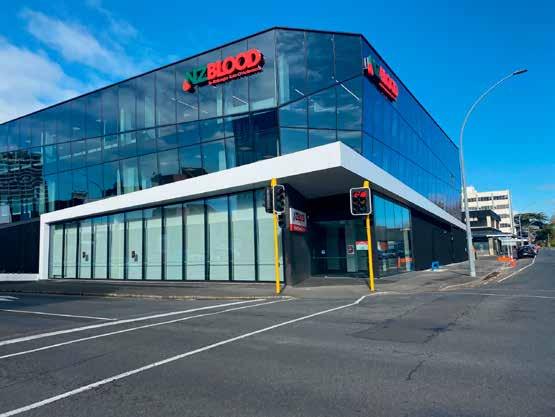
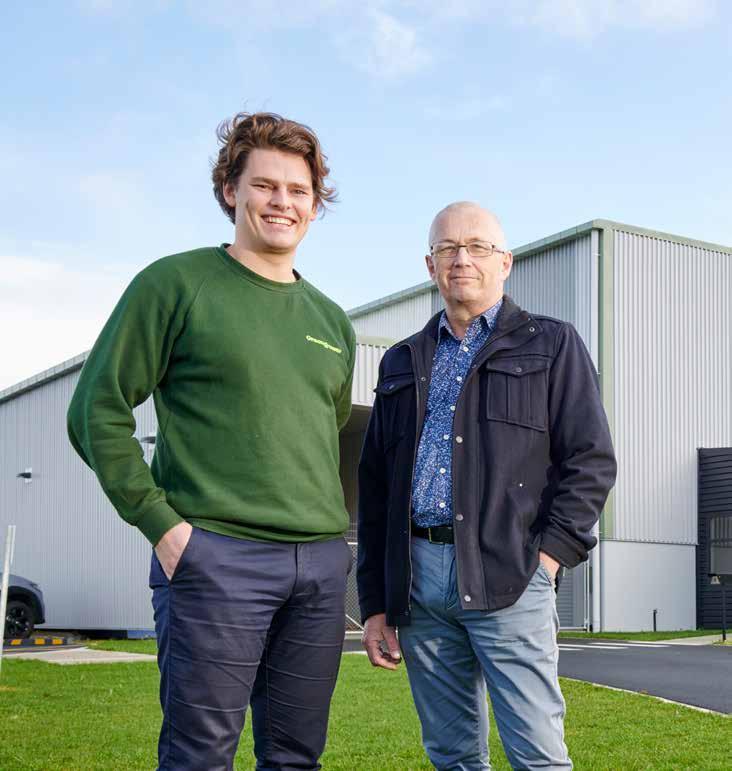
Waikato Innovation Park’s 17-hectare Ruakura business campus in Hamilton is now home to Aotearoa’s first large-scale vertical farm.
Operated by New Zealand horticulture company Greengrower, the 5,900m² facility grows leafy green plants in stacked layers from seed right through to harvest. Fully automated, it uses cutting-edge technology to create ideal growing conditions, tailoring the delivery of light and food to optimise taste and nutrition. It uses 95 per cent less water than conventional horticulture and significantly less electricity than conventional greenhouses.
Greengrower CEO Tom Schuyt pitched the farm’s concept in 2020 to the Waikato Innovation Park team, who didn’t hesitate in engaging Fosters to build the custom designed facility.
“We’d worked with Fosters before on a three-storey commercial building on our campus, and they did a great job for us,” the park’s infrastructure manager Simon Travaglia said.
“They’re one of the best contractors we’ve worked with, so they were our first pick.”
Hamilton engineering and architecture firm Stiles and Hooker designed the warehouse, which incorporates mezzanine growing and robotic
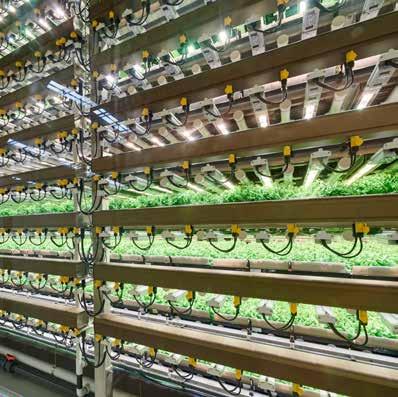
“Fosters are one of the best contractors we’ve worked with, so they were our first pick.”
harvesting areas, controlled humidity rooms and extensive in-ground water services.
“Fosters fed back into the design in terms of how to make things work better,” Simon said.
“We had a few challenges in the way – a few changes in design to incorporate – and they managed that process very well. They kept us informed, tried to minimise the impact of any variations and gave us options.”
He applauded Fosters’ open and honest communication and “exceptional” project management, which resulted in an “extremely low impact” on the busy campus.
“They understood what we wanted from the project,” he said.
The build was delivered on time and on budget.
Simon said he would “absolutely” work with Fosters again. “That’s a no brainer, they went above and beyond for us. They really looked after us on this project. And we’re very grateful to them for that,” he said.
“If I could sum Fosters up with one word it would be integrity.”
Got a build project in mind? Get in touch with Fosters today!